This is Essential Politics, our daily look at California political and government news. Here’s what we’re watching right now:
- California senators advanced three immigration-related bills Tuesday, including a proposal to fund legal aid for immigrants in the state who face deportation.
- What has each member of California’s congressional delegation said about President Trump’s executive order on immigration? Find out your representative’s position here.
- California’s congressional Democrats came out forcefully against Trump’s immigration directives over the weekend, while Republican members of Congress held their fire.
You can find our December news feed archive here.
Be sure to follow us on Twitter for more, or subscribe to our free daily newsletter and the California Politics Podcast
- Share via
In the 2018 governor’s race, Gavin Newsom leads the pack in fundraising
- Share via
Schwarzenegger: ‘We’re going through some difficult moments ... but I guarantee we will work our way out of this’
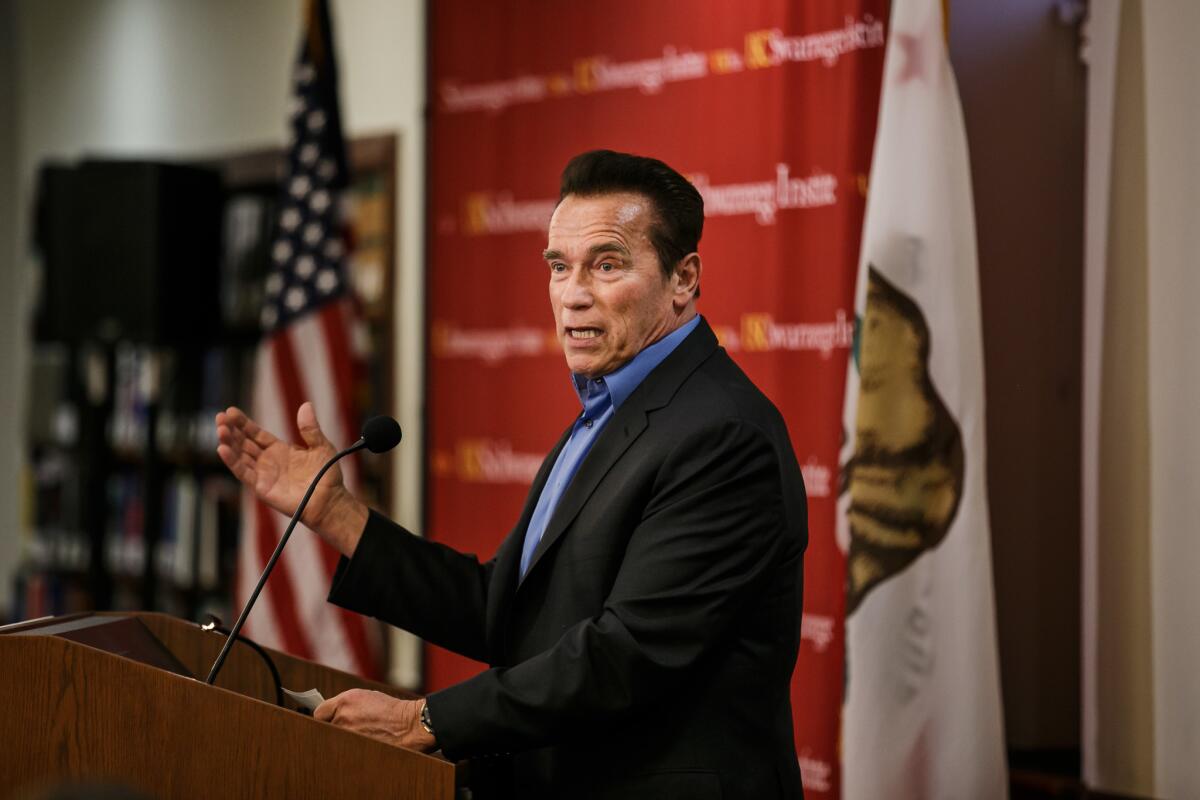
Former Gov. Arnold Schwarzenegger said Tuesday that the United States had faced trying times and political crises before, and has always persevered.
“Yes, we’re going through some difficult moments right now, as we have in the past, but I guarantee we will work our way out of this,” Schwarzenegger said, speaking at an electoral reform event at the University of Southern California.
He recalled immigrating to the United States and seeing the violent protests at the Democratic National Convention in 1968, Watergate and the economic troubles during President Jimmy Carter’s tenure.
“One thing you can count on in America is even though it falls every so often — as we all do — it dusts itself off, gets up and gets going again,” Schwarzenegger said. “That is why … it’s the number one country in the world.”
Although Schwarzenegger did not mention President Donald Trump by name during his remarks, the comments appeared to be a reference to the turbulence since Trump took office less than two weeks ago.
Tensions between Schwarzenegger, who replaced Trump as the host of “Celebrity Apprentice,” and the new president and fellow Republican have been escalating. On Monday, Schwarzenegger called the implementation of Trump’s temporary ban on immigration from several Muslim-majority countries “crazy.” The previous week, Schwarzenegger slammed Trump’s pick to lead the Environmental Protection Agency, Oklahoma Atty. Gen. Scott Pruitt, as a hypocrite.
Earlier in January, Trump mocked Schwarzenegger for the first ratings of “Celebrity Apprentice” after the former governor took over as the host. During the presidential campaign, Schwarzenegger repeatedly made clear his disdain for Trump, pointedly casting his ballot in the California primary for Ohio Gov. John Kasich after he had dropped out.
On Tuesday, Schwarzenegger was headlining an event about redistricting reform at his namesake institute at USC. He did not respond to reporters’ questions after the event.
While governor, Schwarzenegger championed electoral reform, including an ultimately successful effort to take the redrawing of congressional and legislative districts away from politicians and give them instead to an independent commission.
Both political parties have long tried to use gerrymandering to create districts that favor their politicians.
But David Daley, author of “The True Story Behind the Secret Plan to Steal America’s Democracy,” argued that Republicans were able to make unprecedented changes in the 2010 redistricting that will have long-lasting effects on this nation’s politics because of a confluence of factors, including unprecedented technology such as mapping software, and a flood of anonymous money due to the Citizens United ruling.
“In 2010, gerrymandering enters its steroid era,” Daley said.
The end result, he said, was that while the nation remained relatively closely divided between the two parties, the GOP was able to exponentially expand its hold of statehouses, governor’s mansions and congressional seats.
Speakers urged Californians to take the lessons they had learned through the state’s redistricting reform and try to help voters apply them in other states, through the initiative, or legislative or legal systems.
“We are the model for the rest of the nation and that is why we in California have to do everything we can to pull together all the things that happen successfully in California and nationwide,” Schwarzenegger said. “Because the rest of the states are waiting for us.”
- Share via
Top Democratic donor Tom Steyer is planning a larger role opposing President Trump
On Sunday, Tom Steyer was holding a cardboard sign saying “not on my watch” at San Francisco’s airport, one of thousands protesting President Trump’s order preventing visitors from several predominantly Muslim countries.
“I went out there to participate, but also to listen,” he said.
Like other liberal leaders, he’s been hunting for the right approach to counter Trump. Now the deep-pocketed Democratic donor is launching a new effort that could expand the scope of NextGen Climate, the San Francisco-based organization he created and funded.
Although Steyer expects to stay active on environmental issues — the onetime hedge fund manager is best known for advocating stronger steps to fight climate change and support clean energy — he’s looking to play a more expansive role in opposing Trump.
“The number of issues that have to be addressed are broader,” he said in an interview, pointing to Trump’s statements on issues such as voting that he considers to be a broader attack on “fundamental American rights.” In a video posted on Tuesday night, Steyer says, “I promise to do everything in my power to stand up to Trump” and asks for the public’s thoughts on what next steps should be taken.
Steyer spent $74 million in the 2014 midterm election, and then millions more last year to support Hillary Clinton and other Democrats. Although results have been mixed — Republicans gained ground in both years — Steyer said the experiences have positioned NextGen to educate and mobilize voters across the country.
“There are very few people who are set up organizationally to do what we’re trying to do,” he said.
Steyer has already played a role in opposing Trump’s nominees, running advertisements criticizing his choice for secretary of State, former Exxon Mobil Chief Executive Rex Tillerson.
Besides simply fighting Trump, Steyer also hopes to project an alternative view of the country — one that comes with a dose of California sunshine.
“America can pursue a much more optimistic, a much more prosperous, a much more equitable and a much healthier future,” he said.
- Share via
At CNN town hall, House Minority Leader Nancy Pelosi calls Trump ‘reckless’ for refugee ban
House Minority Leader Nancy Pelosi (D-San Francisco) called President Trump “reckless” and his administration “incompetent” Tuesday night for his executive order last week banning refugees and visa holders from seven countries from entering the United States.
Pelosi was participating in a CNN town hall and responding to a question from a Yemeni woman whose mother cannot enter the country, when she said, “Your family is suffering because our president is reckless.”
You can see the full exchange below along with some other highlights from the town hall.
- Share via
Former aide is preparing to run for Rep. Grace Napolitano’s seat if she retires
Rep. Grace Napolitano (D-Norwalk), who turned 80 last year, has not made plans to retire. But one San Gabriel Valley politician is raising funds to run in case Napolitano does decide to bow out after 10 terms in Congress.
Mary Ann Lutz, the former mayor of Monrovia and a former aide to Napolitano, reported having $101,000 in the bank to run for Napolitano’s 32nd Congressional District seat, according to a new filing with the Federal Election Commission.
But Lutz says she will run only if Napolitano retires.
“I have enormous respect for my former boss, Congresswoman Grace Napolitano, and would never run against her for any office,” Lutz said in a statement. “In the event that the 32nd Congressional District seat eventually opens up, I plan to run, and run aggressively.”
Napolitano suffered a minor stroke last February that affected her ability to write and slightly slowed her walk.
She continued her reelection campaign and beat state Assemblyman Roger Hernandez (D-West Covina), who effectively ended his campaign in August after a judge granted his ex-wife’s request for a domestic violence restraining order against him.
During an interview with The Times a day before the November election, Napolitano said the health of her 90-year-old husband would be a key factor in her decision on whether to run for an 11th term in 2018.
“I would love to stay but it depends,” she said. “I will be ready to hang it up when I am ready.”
Lutz was elected in 2003 to the City Council in Monrovia, a city of 36,000 in the foothills of the San Gabriel Mountains, and was elected mayor in 2009. She lost her reelection bid in 2015 and went on to work for Napolitano as an advisor on water issues.
Lutz raised $26,000 and loaned her campaign committee an additional $75,000. Napolitano has $144,692 in the bank if she wants to run again.
- Share via
Repeat challenger to Xavier Becerra enters race to replace him in Congress
- Share via
Villaraigosa raises a quick couple of million dollars for his gubernatorial campaign
- Share via
State Senate committee votes in favor of funding legal aid for immigrants in California facing deportation
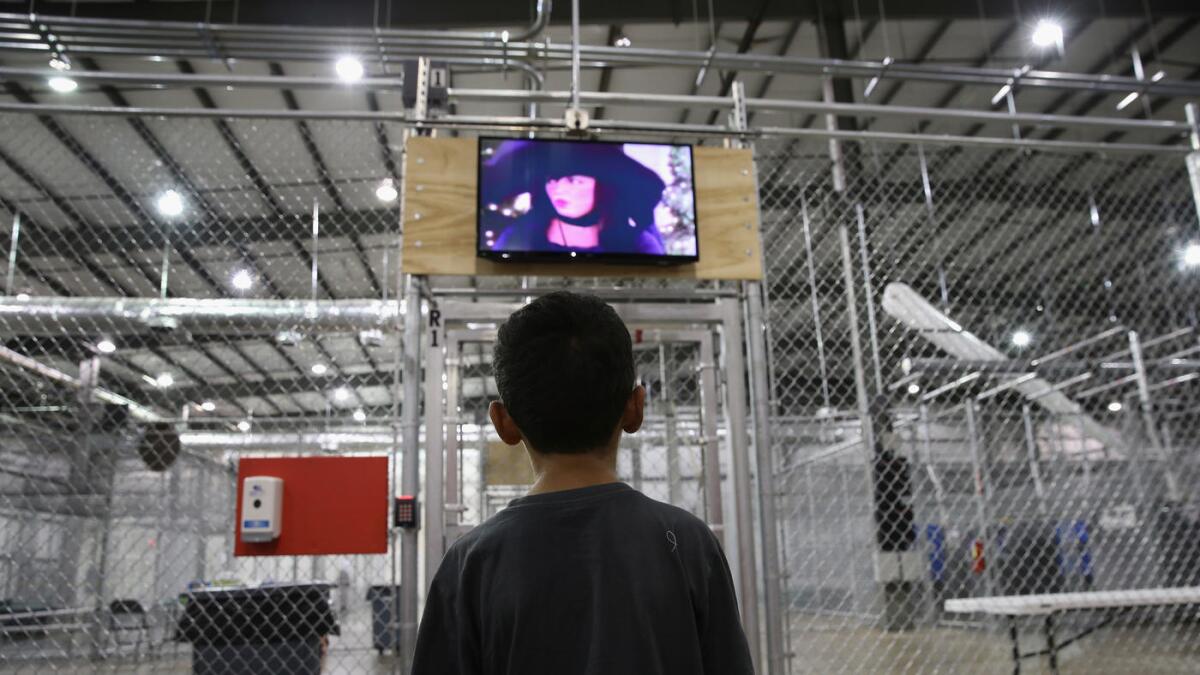
A state legislative bill seeking to expand legal services for immigrants in the U.S. illegally moved out of the Senate Judiciary Committee on Tuesday on a 5-2 vote. The bill, introduced by state Sen. Ben Hueso (D-San Diego), would create a legal defense program funded with state money that would provide lawyers for immigrants caught in deportation or removal proceedings.
It comes roughly three years after the Unaccompanied Undocumented Minors program began providing state-funded legal services for young refugees fleeing gang violence in Central America.
Hueso said the measure faced new urgency given President Trump’s executive orders last week on immigration.
“This is a bill protecting Californians, protecting their families, but also protecting California’s economic prominence,” Hueso said. “I hope we can all stand united on this and say, ‘Yes, we stand by our immigrant community in California.’”
Members of the committee raised concerns about whether it whittled away at defense services available for detainees convicted of certain crimes — and over how the state would be able to afford it amid a looming deficit and budget cuts from the federal government.
“It is well-meaning, but it is a whole different agency that we are setting up in an expedited way,” Sen. Bob Wieckowski (D-Fremont) said.
- Share via
California assemblyman wants state to make cleaner purchases
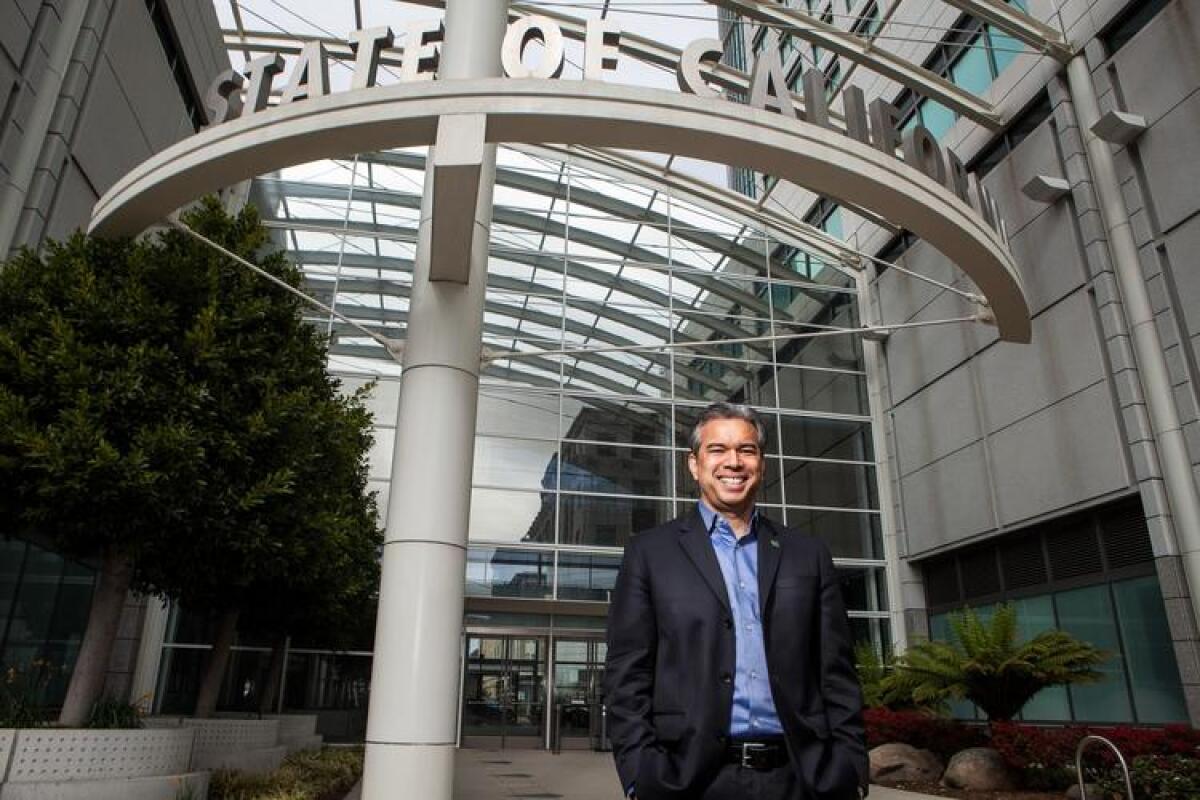
A California lawmaker wants state officials to consider greenhouse gas emissions when making new purchases, a proposal that would add a new wrinkle to the bidding process for government contracts.
Assemblyman Rob Bonta (D-Oakland) said the legislation (AB 262) would “harness the state’s enormous buying power to support clean manufacturing.”
The measure, which includes state agencies and university systems, would affect the purchase of materials such as asphalt, cement, steel and glass for projects such as hospitals, dormitories and roads.
Companies bidding on state contracts would be required to report greenhouse gas emissions generated by the manufacturing and transportation of supplies. Officials would then factor that information into their decision.
Given California’s goal of slashing emissions, Bonta said he hopes that the legislation “puts the state’s money where its values are.” He doesn’t expect the requirement to report more information would be a significant burden on companies seeking contracts.
“This will just be one more piece of information that will need to be added,” he said.
- Share via
John Chiang rakes in $4.2 million for his gubernatorial campaign, keeps spending to a minimum
- Share via
First of several immigrant protection bills clears state Senate Public Safety Committee

As national debate and protests have taken place over President Donald Trump’s executive actions on immigration and refugees, the state Senate Public Safety Committee on Tuesday passed the first of several bills aimed at protecting immigrants in California.
Senate Bill 54, introduced by Senate President pro Tem Kevin de León (D-Los Angeles), would prohibit state and local law enforcement agencies from using resources to investigate, detain, report or arrest persons for the purposes of immigration enforcement.
The proposal, dubbed the California Values Act, also aims to protect immigrants’ personal data, requiring state agencies to review their confidentiality policies and to ensure that they are only collecting information necessary to their departments.
It moved out of committee with a 5-2 vote.
The bill seeks to strengthen immigrant protections threatened under Trump’s executive actions. In orders signed last week, the president pledged to cut federal dollars from so-called sanctuary cities, which have policies limiting the cooperation between local law enforcement and federal immigration authorities.
At a committee hearing Tuesday, De León said the proposal builds on the California Trust Act, which Gov. Jerry Brown signed in October 2013. The state law prevents law enforcement agencies from detaining immigrants longer than necessary for minor crimes so that federal immigration authorities can take them into custody.
A long line of immigrant advocates, lawyers and lobbyists rose in support of the bill, saying it would continue to help law enforcement officials build trust within immigrant communities and allow more victims and witnesses to report crime.
Democratic members in the committee urged their Republican colleagues to vote for the legislation and move away from Trump’s rhetoric, which they said stereotyped immigrants as criminals. They pointed to low crime rates in immigrant communities and stressed that many police chiefs do not want to enforce immigration laws.
Nancy Skinner (D-Berkeley), chair of the committee, said people across California were under economic stress that could be manipulated into fear.
“All of us want hardened criminals prosecuted under the law,” she said. “All of us. But what we are watching now is a pitting of people against each other, a targeting of immigrants.”
Opponents were not swayed. They said the bill’s language was too broad and could prevent communication among police agencies at different levels of government, allowing dangerous criminals to escape prosecution.
“I’m concerned that you are basically making the state of California a de facto sanctuary state,’” Sen. Jeff Stone (R-Murrieta) told De León.
- Share via
Sen. Kamala Harris to vote no on Trump’s pick to lead Education Department
- Share via
State Senate committee weighs bill some say would turn California into a ‘sanctuary state’
- Share via
California lawmakers seek stricter enforcement, more transparency at state toxics control agency
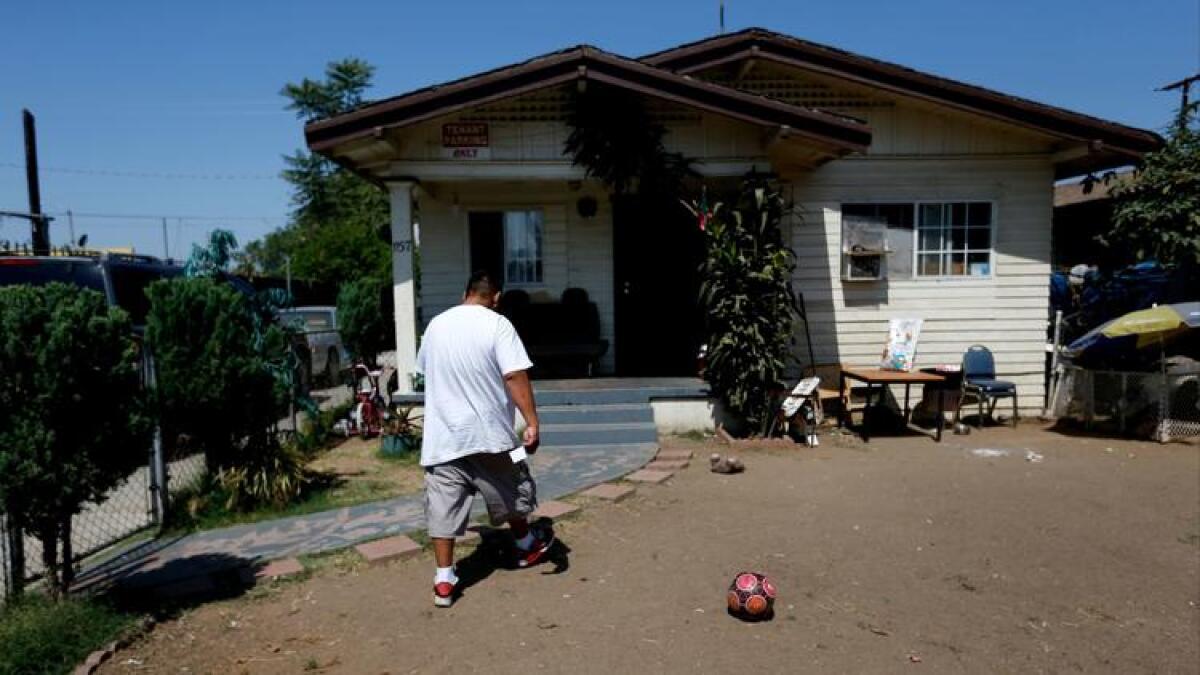
Assembly Democrats unveiled a package of five bills Tuesday aimed at reforming the state agency tasked with regulating toxic substances.
The Department of Toxic Substances Control has been roundly criticized for its flat-footed response in regulating and cleaning up pollution from the now-closed Exide battery recycling plant in Vernon.
A Los Angeles Times review in 2015 found the department knew for years that the plant was violating environmental regulations but was slow to act on it.
“Too many communities, including communities I represent, have been harmed by toxic emissions that were released into their neighborhoods — emissions that could and should have been stopped,” Speaker Anthony Rendon (D-Paramount) said in a statement. “The goal of this legislative package is a more transparent, accountable, and responsive Department of Toxic Substances Control — and safer and healthier communities throughout California.”
The proposed legislation includes:
- AB 245 by Assemblyman Jimmy Gomez (D-Los Angeles), which would require hazardous waste facilities to comply with higher financial assurance requirements to make sure there are adequate funds for contamination cleanup.
- AB 249 (Gomez), which would increase maximum penalties the department can assess to match what the federal government can assess in similar situations.
- AB 248 by Assemblywoman Eloise Gomez Reyes (D-San Bernardino), which would require hazardous waste facilities to submit permit renewals two years prior to the current permit’s expiration to avoid lapses.
- AB 246 by Assemblyman Miguel Santiago (D-Los Angeles), which would promote the use of fence line monitoring by facilities to better detect leaks.
- AB 247 by Assemblywoman Cristina Garcia (D-Bell Gardens), which would create a statewide task force focused on reducing lead poisoning in the state.
- Share via
Sen. Dianne Feinstein says she will vote ‘no’ on Jeff Sessions’ nomination for U.S. attorney general
California Sen. Dianne Feinstein announced this morning that she will vote “no” on the nomination of Alabama Sen. Jeff Sessions for U.S. attorney general. The statement comes after protestors visited Feinstein’s home and office out of concern that she may vote in favor of the nomination.
“It is very difficult to reconcile for me the independence and objectivity necessary for the position of attorney general with the partisanship this nominee has demonstrated,” Feinstein said Tuesday. “We are being asked to determine whether this nominee’s record demonstrates that he will have the objectivity to enforce the law for all Americans and be an independent attorney general and not an arm of the White House.”
Feinstein is the ranking Democrat on the Senate Judiciary Committee, which votes today on the confirmation of Sessions to be President Trump’s attorney general.
Feinstein pointed to former acting U.S. Atty. Gen. Sally Yates as an example of what she is looking for. Yates was fired Monday, just hours after she announced that the Justice Department would not defend Trump’s controversial executive order banning refugees and travelers from certain countries.
“Yesterday, early in the evening, we clearly saw what a truly independent attorney general does…I have no confidence that Senator Sessions will do that,” Feinstein said. “Instead, he has been the fiercest, most dedicated, and most loyal promoter in Congress of the Trump agenda, and has played a critical role as the clearinghouse for policy and philosophy to undergird the implementation of that agenda.”
- Share via
Protesters descend on Sen. Dianne Feinstein’s home and office to urge ‘no’ vote on Sessions appointment
Dozens of protesters concerned that Sen. Dianne Feinstein could vote to confirm Sen. Jeff Sessions as U.S. attorney general gathered Monday evening outside her office in Santa Monica.
Several held signs bearing the familiar “No Ban, No Wall” slogan that Trump protesters have used in recent days. Others chanted, “Hey, Feinstein, hear us shout, if you don’t we’ll vote you out!”
Organizer Hannah Allison with Democratic Socialists for America said her group pulled together the protest over the last couple days. Word about the protest spread late Monday through social media, with many others pledging to call Feinstein’s offices to register opposition to Sessions’ appointment.
“People are so absolutely outraged about Sessions and they don’t want to see a racist attorney general,” Allison said.
Wesley Taylor, 30, said he heard about the protest through word of mouth.
“I came out here to make certain that she votes no,” said Taylor, an actor.
The protest follows similar action over the weekend, when an estimated 200 protesters showed up at a park next to Feinstein’s San Francisco home, urging her to vote against Sessions. Organizers of that protest told the San Francisco Chronicle that they were responding to what they felt was unresponsiveness from Feinstein’s office.
The Senate Judiciary Committee, on which Feinstein sits as the senior Democrat, is expected to vote Tuesday on Trump’s appointment of Sessions. So far, Feinstein has voted with other Democrats to support Nikki Haley for the post of U.N. ambassador, James Mattis for secretary of Defense, Mike Pompeo as CIA director and John Kelly for secretary of Homeland Security.
Feinstein’s office did not immediately respond to a request for comment.
- Share via
Where do California’s members of Congress stand on President Trump’s refugee order?

President Trump’s executive order Friday, which blocked U.S. entry to refugees and nationals of seven Muslim-majority nations, brought thousands of Americans to the nation’s airports in protest over the weekend.
Several Democrats from California’s 54-member congressional delegation joined constituents at airports, and lobbied customs and Border Patrol officials to release the detained visa holders. Many of the state’s 14 Republican representatives were initially silent on the executive order. Several have since voiced their support, while others were critical of the order’s rollout.
Here’s a look at what each member of the California congressional delegation has said about the executive order:
- Share via
California state Senate passes resolution condemning President Trump’s refugee ban
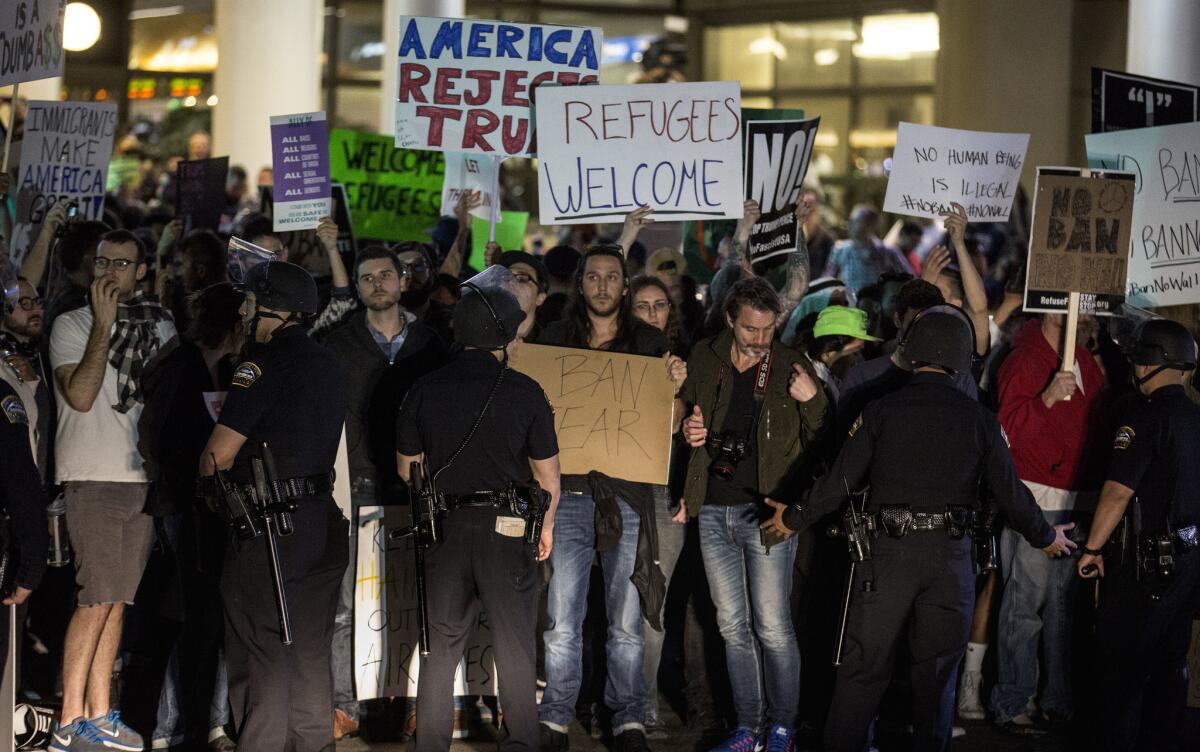
After nearly two hours of debate, the state Senate on Monday passed a resolution that condemned President Trump’s executive order banning immigrants and refugees from seven predominantly Muslim countries, calling it “discriminatory overreach.”
Democrats introduced the resolution after the president’s order Friday spurred a weekend of protests and chaos at airports across the country. The resolution denounces Trump’s actions and urges the U.S. Department of Homeland Security to comply with federal court orders permitting detainees to have timely access to counsel.
It cleared the Senate floor with a 26-11 vote largely along party lines, reflecting the national rift over Trump’s immigration order. Two Republican members abstained.
On the Senate floor, Democrats called the executive order an affront on religious freedom that panders to fear and foments discrimination, and said it would not further public safety. Reaching to members across the aisle, they said the resolution was not about partisanship or opposing Trump, but about protecting American institutions.
In a fiery speech, state Sen. Hannah-Beth Jackson (D-Santa Barbara) said the order is unconstitutional and violates fundamental rights.
“You see this is how we end up with fascism and totalitarianism,” she said.
Sen. Holly Mitchell (D-Los Angeles) said she did not want four more years of executive orders “crafted in the cover of darkness.”
But Republican members said that President Obama had taken similar actions and that they had a duty to their constituents, who were worried about national security and a vetting process they said did not stop terrorists from entering the nation’s borders. Obama has rejected comparisons of his policy to Trump’s.
“We do not welcome those who have come here to harm us,” Sen. Jim Nielsen (R-Gerber) said, urging a “no” vote. “We cannot ignore contemporary reality. Our enemies do not reside beyond our shores. They are within.”
The resolution states that 134 million people are temporarily barred from entering or reentering the United States, including nationals with dual citizenship. Hundreds of thousands with visas are also blocked, it says.
The resolution also denounces the manner in which the executive order was executed, saying it was not fully vetted by the departments tasked with protecting the nation’s national security interests.
- Share via
State attorneys general met in Florida to strategize on how to counter Trump, Becerra says
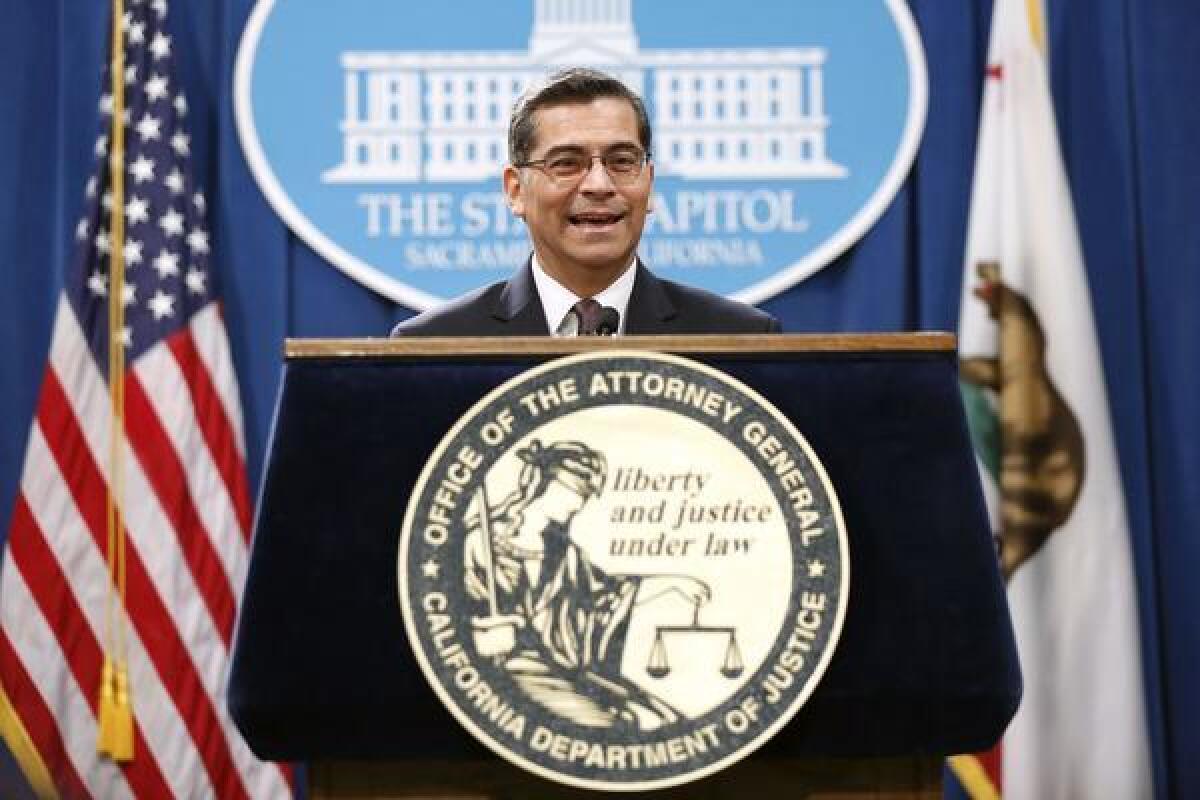
A joint statement by 15 attorneys general over the weekend condemning President Trump’s refugee order grew out of a meeting in Florida between California Atty. Gen. Xavier Becerra and some of his concerned counterparts, Becerra said Monday.
Becerra gathered Thursday in Fort Lauderdale with other attorneys general, including Washington Atty. Gen. Bob Ferguson, to strategize about responding to the Trump administration on various issues.
The meeting took place at the annual winter conference of the Democratic Attorneys General Assn.
“Several of the AGs have been in communication,” Becerra said in an interview with The Times. “We made it very clear in our joint statement that we are going to do everything we can to make sure that the unlawful, unconstitutional executive orders by the Trump administration don’t see the light of day.”
Officials who signed the joint statement included legal representatives from Washington, Connecticut, Hawaii, Illinois, Iowa, Maine, Maryland, Massachusetts, New Mexico, New York, Oregon, Pennsylvania, Vermont and Virginia.
On Monday, Ferguson announced he was suing Trump over the executive order that suspended refugee entries for 120 days and barred entry to the U.S. for 90 days for those traveling from Iran, Iraq, Libya, Somalia, Sudan, Syria and Yemen.
Becerra said that he had been in contact with Ferguson and that the option to pursue legal action is under consideration for California.
“That’s one of many avenues of how we are looking to approach this,” Becerra said.
As a result of the Florida meeting, Becerra said, the top lawyers from the 15 states are collaborating on how to address various Trump directives.
“Everyone is doing a little bit of something,” he said. “Everyone’s trying to figure out how best to address this.”
Florida Atty. Gen. Pam Bondi, a Republican, did not attend the meeting, Becerra said.
- Share via
California congressional Democrats protest against Trump’s travel ban from steps of Supreme Court
- Share via
State senators debate resolution opposing Trump’s immigration actions
- Share via
California warily watches President Trump while pushing forward on climate change

It’s been a decade since California set its first target for slashing greenhouse gas emissions, one of several policies that has made the state an international leader in the fight against global warming.
So while President Trump suggests he’s going to roll back the country’s environmental regulations, state leaders insist they won’t be knocked off track here.
“This is when you do your best work,” said John Laird, secretary of the California Natural Resources Agency. “We can’t worry about pulling back just to sink with everyone else who isn’t moving at all.”
- Share via
Rep. Pete Aguilar slams White House for invoking San Bernardino attack in defending immigration ban
Rep. Pete Aguilar (D-Redlands) is getting frustrated with President Trump and his staff mentioning the 2015 San Bernardino shooting to defend an executive order banning refugees and others from seven predominantly Muslim countries.
“This executive order will do nothing to make our country safer and only sends a message of hate and bigotry to the rest of the world,” Aguilar, who represents the district where the site of the shooting is located, said in a statement. “This order would not have prevented the attack in San Bernardino and the use of San Bernardino as justification for this anti-Muslim policy is a revolting way to exploit our community.”
Fourteen Californians were killed in the December 2015 attack by Syed Rizwan Farook, an American, and his wife Tashfeen Malik, who was raised in Pakistan and lived in Saudi Arabia before marrying him.
People from Pakistan and Saudi Arabia are not affected by Trump’s order, which bars all refugee entries for 120 days, blocks Syrian refugees indefinitely and bars for 90 days the entry of citizens from Iraq, Iran, Syria, Yemen, Sudan, Libya and Somalia.
- Share via
Rep. Duncan Hunter urges Trump to make an executive order exemption for Iraqis who aided U.S. military
Reps. Duncan Hunter (R-Alpine) and Adam Kinzinger (R-Ill.) are asking President Trump to approve waivers to his executive order for Iraqis who helped the American military.
Hunter and Kinzinger, who both served in Iraq and Afghanistan, said in the letter to Trump that they supported a request from Defense Secretary James N. Mattis that visa reviews for some Iraqis be fast-tracked.
“For the safety of these courageous individuals and their families, and in the interest of our national security, it’s critical that we make this exception and do so swiftly,” the congressmen said in a statement.
The executive order Trump signed Friday bars all refugee entries for 120 days, blocks Syrian refugees indefinitely and bars for 90 days the entry of citizens from Iraq, Iran, Syria, Yemen, Sudan, Libya and Somalia.
Some of the earliest stories of people caught up in the ban included military interpreters from Iraq who had visas.
“We respectfully ask that you take this action to ensure these individuals are not put in any further danger. Doing so would send a strong signal to those who show such immense courage to advance U.S. security interests at a risk to their own safety, as well as the many veterans and warfighters who’ve relied on the service of these individuals for their own protection and to accomplish their objectives,” their letter states.
- Share via
Democrats target 7 congressional seats held by California Republicans for 2018 midterm elections
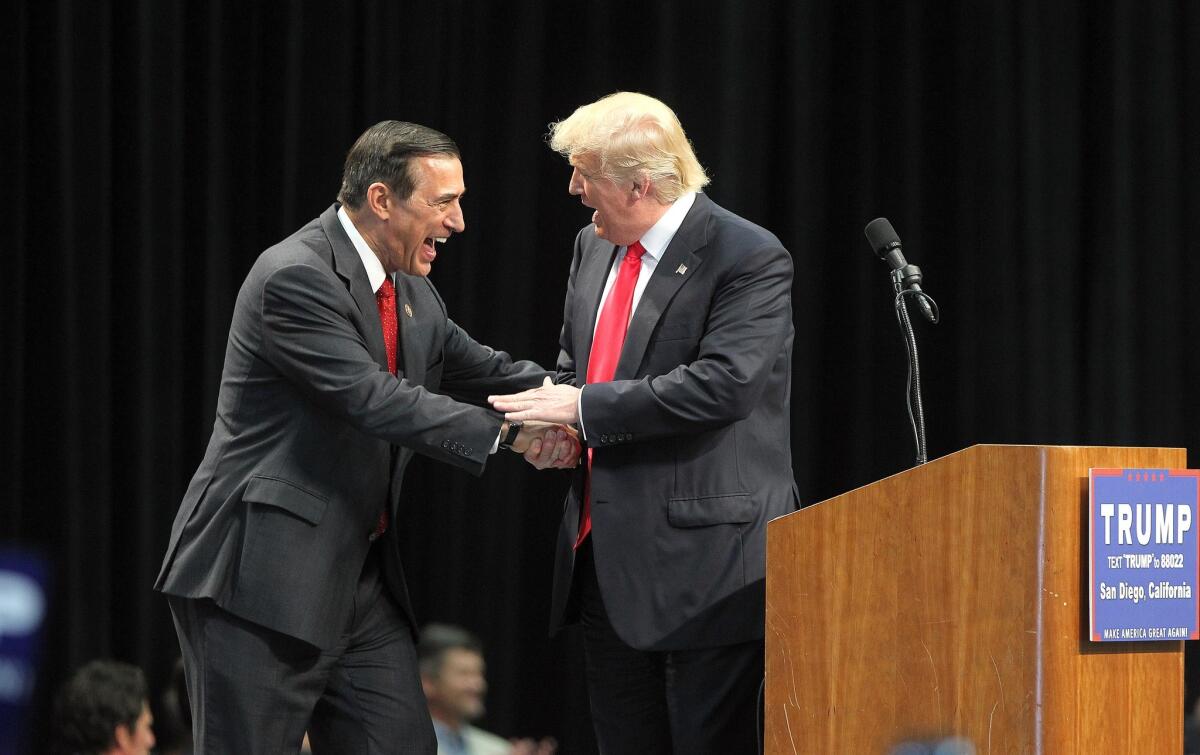
The Democratic Congressional Campaign Committee has released a list of top targets looking ahead to the 2018 elections, and California’s Republican delegation is a big part of it.
Of the 61 Republicans Democrats are looking to unseat nationwide, seven are Californians:
- CA-10: Jeff Denham (R-Turlock)
- CA-21: David Valadao (R-Hanford)
- CA-25: Steve Knight (R-Palmdale)
- CA-39: Ed Royce (R-Fullerton)
- CA-45: Mimi Walters (R-Irvine)
- CA-48: Dana Rohrabacher (R-Costa Mesa)
- CA-49: Darrell Issa (R-Vista)
All of these lawmakers represent districts carried by Hillary Clinton in the general election, with Valadao’s district voting for Clinton over Trump by double-digit margins. Many of them seemed to win despite Trump in 2016, out-polling him by at least several percentage points.
Issa and Denham won by the closest margins of the group, with Issa eking out a 51-49 win over Doug Applegate, who has already said he’ll run again in 2018. Denham overcame two-time challenger Michael Eggman by less than five percentage points.
Denham, Issa and Valadao were also among the top spenders in California on a per-vote basis in the November election, spending well above $30 per each vote they received.
In a memo, the Democratic committee noted Trump’s low approval ratings and the fact that few presidents in history have seen their party gain seats in Congress during the first midterm elections.
- Share via
Democrats in the California Legislature move to condemn President Trump’s immigration orders
- Share via
Assembly Republican leader Chad Mayes voices his misgivings about refugee order
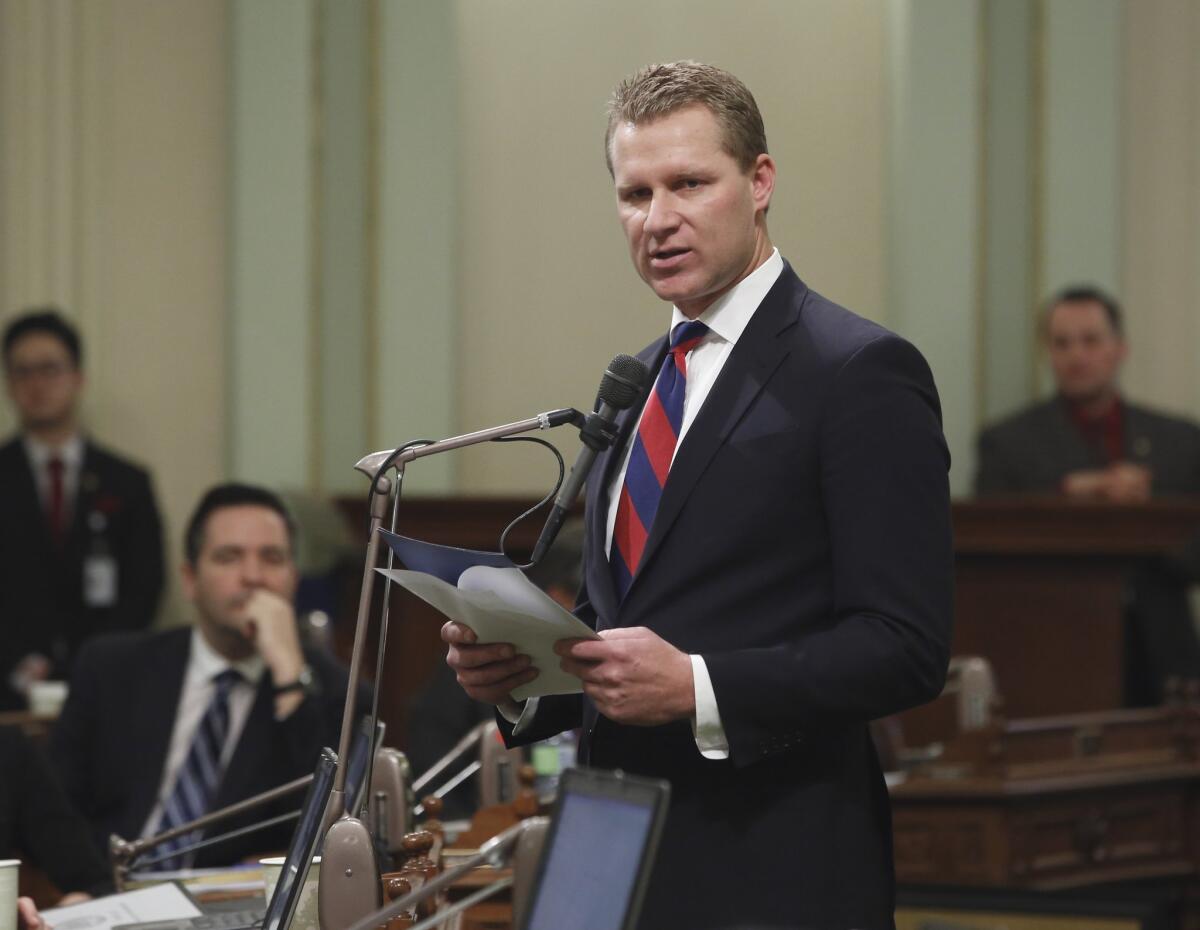
Assembly Republican Leader Chad Mayes of Yucca Valley on Monday joined a number of GOP politicians who are voicing misgivings about President Trump’s order temporarily barring refugees from some majority-Muslim countries from entering the country.
“Religious liberty is a core value of our nation. My ancestors immigrated to America to flee religious persecution,” Mayes said in a statement. “While bolstering our national security is important, when forced to decide between security and liberty, I will always side with liberty.”
“He is concerned about them [the orders],” said Matt Mahon, a spokesman for the assemblyman.
Trump’s directives suspended refugee entries for 120 days and barred entry to the U.S. for 90 days for those traveling from Iran, Iraq, Libya, Somalia, Sudan, Syria and Yemen.
- Share via
Rep. Zoe Lofgren and other ranking Democrats demand emergency meeting on refugee ban
After two days of protests across the country over President Trump’s order Friday banning refugees from seven countries, Rep. Zoe Lofgren (D-San Jose) and the ranking Democrats of three committees that oversee immigration issues are demanding a meeting with President Trump’s new Homeland Security secretary, John F. Kelly.
The move by Trump prevented green card and visa holders from reentering the country, and led to the detention of more than a hundred people landing at U.S. airports with valid entry documents. Late Saturday, a federal judge in New York issued a temporary stay against the deportation of anyone who had arrived with a valid visa.
The letter demanding the meeting, signed by Lofgren, Judiciary Committee ranking member John Conyers (D-Mich.), Homeland Security Committee ranking member Bennie Thompson (D-Miss.) and Foreign Affairs Committee ranking member Elliot Engel (D-N.Y.), calls for it be scheduled by the close of business Wednesday. The Democrats also ask for more information about how the order is being implemented, whether the stays placed by federal judges over the weekend are being followed and whether green card holders are affected.
“Only two days after the order was signed it is clear that it has already led to panic and disorder, not to mention protests,” the letter states. “This is apparently due in part to the lack of internal administration review prior to its issuance as well as a lack of clarity and guidance provided thereafter.”
Lofgren, a former immigration attorney and the ranking Democrat on the Judiciary Committee’s Immigration Subcommittee, also plans to file legislation today to rescind the executive order. Getting such legislation through the House could be difficult with Speaker Paul Ryan supporting the executive order. Sen. Dianne Feinstein (D-Calif.) is proposing similar legislation in the Senate.
House and Senate Democrats plan to hold a rally against the order outside the Supreme Court Monday evening.
- Share via
As California Democrats blast Trump’s refugee order, Republicans in the congressional delegation hold their fire
Only a few of the state’s 14 Republican representatives have publicly commented on an executive order signed by President Trump on Friday that barred refugees and green card holders from seven countries from entering the U.S.
Rep. Devin Nunes (R-Tulare) released a statement Sunday night saying some tweaks are needed, but his background as chairman of the House Select Intelligence Committee leads him to support the executive order.
“In light of attempts by jihadist groups to infiltrate fighters into refugee flows to the West, along with Europe’s tragic experience coping with this problem, the Trump administration’s executive order on refugees is a common-sense security measure to prevent terror attacks on the homeland. While accommodations should be made for green card holders and those who’ve assisted the U.S. armed forces, this is a useful temporary measure on seven nations of concern until we can verify who is entering the United States,” he said.
Rep. Ed Royce (R-Fullerton) told the Washington Post that “pausing the intake of refugees from terror hotspots is the right call to keep America safe,” but he hopes the cases of people traveling on visas who were prevented from reentering the country are resolved quickly.
Rep. Jeff Denham (R-Turlock) said on Twitter on Sunday that the rollout has created confusion, and that executive orders aren’t the way to fix the country’s long-term problems.
Several of California’s 38 Democratic congressional representatives and the state’s two senators were out in force over the weekend demanding the release of refugees and green card holders, and an end to the executive order.
Sen. Dianne Feinstein (D-Calif.) announced two pieces of legislation she’ll file in response. One would immediately rescind the president’s order. The second would limit executive authority under the Immigration and Nationality Act to prevent a president from unilaterally banning groups of immigrants.
“It’s clear that the president gave little consideration to the chaos and heartbreak that would result from this order,” she said in a statement.
Sen. Kamala Harris (D-Calif.) joined protesters outside the White House Sunday afternoon.
In Los Angeles, Reps. Maxine Waters (D-Los Angeles) and Ted Lieu (D-Torrance) joined protesters at Los Angeles International Airport. On Saturday, Reps. Judy Chu (D-Monterey Park), Nanette Barragán (D-San Pedro) and Lou Correa (D-Santa Ana) joined the initial protests at the airport, and worked to get some of those being held released.
Rep. Eric Swalwell (D-Dublin) accompanied protesters at San Francisco International Airport Sunday.
2:31 p.m. Jan. 30: This post was updated to clarify Rep. Ed Royce’s statement about the executive order. It was originally published Jan. 29.
- Share via
Protests beginning at LAX Sunday morning
- Share via
California Sen. Kamala Harris joins protesters outside the White House
- Share via
State Atty. Gen. Xavier Becerra condemns Trump’s refugee order and explores challenge
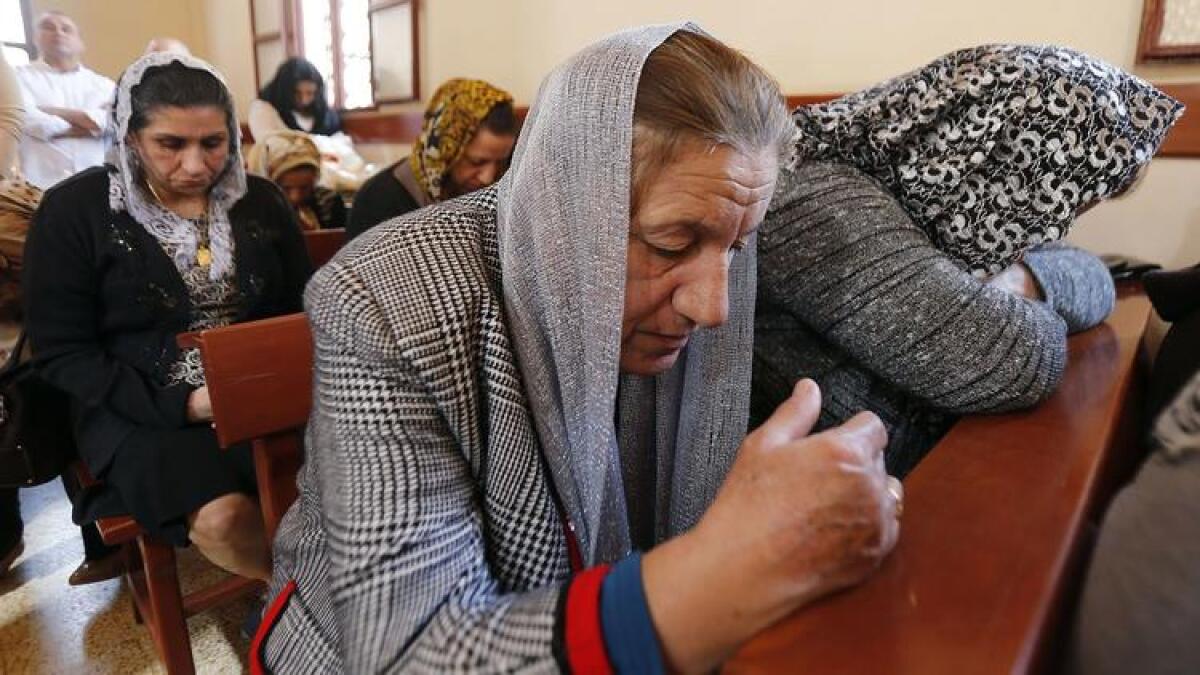
California state Atty. Gen. Xavier Becerra on Saturday condemned an executive order by President Donald Trump barring people from some Muslim-majority countries from entering the U.S. and said he is consulting with legal advisors over a way to challenge the directive.
Trump has suspended all refugee entries for 120 days and barred entry to the U.S. for 90 days for those traveling from Iran, Iraq, Libya, Somalia, Sudan, Syria and Yemen.
“Justice in America doesn’t live or die on the stroke of one man’s pen regardless of how high his office,” Becerra said in a statement late Saturday, less than a week after taking office. “The Trump Administration’s anti-religion, anti-refugee executive order is in so many ways unjust and anti-American”
He said the order discriminates against people based on their faith and denies entry to those with fears of death and persecution.
“I have conferred with my team, and we are reaching out to others as well, to find every avenue possible to defend our family members and those who live permanently in our communities who may be barred from re-entry into America,” Becerra said.
“The Trump executive order should not stand and must be confronted as a constitutional overreach,” he added.
- Share via
California Politics Podcast: Reactions to President Trump’s first week
Even before the weekend controversy and protests, California’s top elected officials spent much of the last week reacting to the first moves by President Donald Trump.
On this week’s California Politics Podcast, we take a closer look at the sharp words offered by Gov. Jerry Brown in his State of the State speech when it comes to the new politics of Washington.
We also focus much of this week’s discussion around three big topics that caught the attention of a number of California lawmakers: immigration moves by Trump; the rough week that was for the nation’s environmental protection enforcers; and rekindled but unproven allegations of widespread voter fraud.
I’m joined by Marisa Lagos of KQED News and Anthony York of the Grizzly Bear Project.
- Share via
State Atty. Gen. Xavier Becerra: Trump’s executive order ‘must be confronted as a constitutional overreach’
- Share via
California Reps. Nanette Barragán and Judy Chu show up at LAX amid protests against Trump’s refugee ban
- Share via
Democratic legislators to join LAX protest of immigration ban
- Share via
Gov. Jerry Brown will undergo new round of treatment for prostate cancer, but won’t miss any work
Gov. Jerry Brown, who first was diagnosed with prostate cancer in 2012, will begin a new round of treatment for the disease, his office reported on Saturday.
Brown, 78, will maintain his duties as governor during the treatment, according to his staff. No additional details were provided about how long the treatment will take, or what prompted its timing.
“Fortunately this is not extensive disease, can be readily treated with a short course of radiotherapy, and there are not expected to be any significant side effects,” said Dr. Eric Small, a UC San Francisco oncologist, in an emailed statement provided to reporters. “The prognosis for Gov. Brown is excellent.”
Brown initially learned he had prostate cancer in late 2012 and underwent similar treatment for several weeks. The governor has also been treated for basal cell carcinoma — a type of skin cancer — twice in the past nine years, with reconstructive surgery on the right side of his nose in 2011.
With almost two years remaining on his final term in office, Brown is already the oldest governor in California history. He often made a point of pointing out his physical fitness in his return to the job in 2011, including a 2012 challenge to New Jersey Gov. Chris Christie of “a 3-mile race, a push-up contest and a chin-up contest.”
Though he’s been treated in San Francisco, the governor and First Lady Anne Gust Brown now live full-time in the historic governor’s mansion in Sacramento after moving out of Oakland last year.
- Share via
‘This is a Muslim ban’: Kamala Harris, Nancy Pelosi and Dianne Feinstein rail against Trump’s refugee ban
They were joined by multiple other California Democrats, who almost immediately reacted to President Trump’s order to temporarily ban most refugees from entering the U.S.
- Share via
Latest candidate in race to replace Becerra helped run his father’s long-shot 2016 presidential campaign
Ricardo De La Fuente, the son of a long-shot presidential candidate who ran as both a Democrat and an independent in 2016, says he will now run for Congress in Los Angeles’ 34th Congressional District.
De La Fuente, 27, was born and raised in San Diego and says he helps run his family’s real estate and business empire, which was started by his grandfather. He says he is also involved with solar energy start-up companies.
De La Fuente most recently served as campaign director for the failed presidential and U.S. Senate bids of his father, Roque “Rocky” De La Fuente, and says he will step away from the family business to run full time for Congress. He recently moved to downtown Los Angeles.
“I want to serve my community, and I think it’s about time my generation jumps in the political realm and gets involved,” the younger De La Fuente said. His father appeared on Democratic presidential primary ballots in at least two dozen states last year and ran as a Democratic candidate for U.S. Senate in Florida, earning 5.4% of the primary vote.
The elder De La Fuente then ran as an independent in the general presidential election, filing for recounts in Wisconsin and Nevada, where he received 1,500 and 2,500 votes, respectively.
Ricardo De La Fuente is one of at least 19 candidates vying for this seat. Candidates have until Feb. 9 to turn in papers with the L.A. County registrar to qualify for the April 4 special primary ballot. If no candidate receives more than 50% of the vote, a runoff will be held June 6.
- Share via
Hundreds rally against Obamacare repeal at Rep. Kevin McCarthy’s office
House Majority Leader Kevin McCarthy’s Bakersfield-based district has been a flashpoint in the debate over how to overhaul healthcare in recent weeks.
- Share via
Atty. Gen. Xavier Becerra takes a jab at the Trump administration when asked about the battles to come
- Share via
Proposed law would make penalties for using fake immigration papers the same as those for using fake driver’s license
A proposed California law seeks to ensure that a person who uses false documents to conceal their citizenship status faces the same punishment as a person who uses a fake driver’s license.
The legislation by Assemblyman Raul Bocanegra (D-Pacoima) would amend the penal code to make both crimes “wobblers,”
meaning prosecutors would have the discretion to charge suspects in such cases with either felony offenses or lower-level misdemeanors.
Under the proposal, the repercussions for defendants would be the same: If convicted of a misdemeanor, offenders would have to serve up to one year in county jail, while a felony conviction would mean up to 16 months in county jail, or two or three years in prison.
A spokesman for Bocangera said the measure was introduced as a proactive response to President Trump’s hard-line stance on immigration and would reverse part of Proposition 187, a controversial ballot measure to deny public services, such as education and healthcare, to immigrants in the country illegally.
The proposition, approved by voters in 1994, requires any person who uses false immigration records to face felony charges. Bocangera’s bill amending those provisions would need a two-thirds vote in the Assembly and the state Senate to pass.
“Today, if an underage college student uses a fake ID to purchase a six-pack of beer, he or she can be charged with a misdemeanor,” Bocanegra said in a statement. “However, if an immigrant is caught using that same fake ID, he or she is automatically charged with a felony and is subject to five years in prison. This is fundamentally unfair.”
- Share via
Fearing catastrophe, California’s Gov. Jerry Brown wants the world’s leaders to stop ‘goofing off’
Gov. Jerry Brown pointedly criticized world leaders for “goofing off” instead of addressing looming problems with climate change and nuclear weapons during a radio interview on Friday.
“They’re really averting their gaze,” he said. “And that is dangerous, very dangerous.”
Brown has become increasingly outspoken about issues he describes as existential threats to humanity, and the election of Donald Trump has only made him more concerned. During the interview, he spoke in sweeping terms about the need to support scientific research in the face of political denial.
“Darkness cannot totally extinguish the light,” Brown said while criticizing Republicans for refusing to accept the scientific consensus around climate change and the need for dramatic changes to confront global warming.
At another point, Brown mused that humans have accumulated vast power without a corresponding increase in wisdom. That creates “a gap between the power to destroy and the wisdom to control those destructive forces.”
Brown reiterated his plan to push forward California’s policies on climate change even if Trump follows through on the federal government’s plans.
“We’re going to do everything we can to stay on track,” he said.
- Share via
Some California lawmakers say it’s time to expand how the state defines ‘violent crime’
As California undergoes the largest overhaul of prison parole in a generation, some lawmakers and law enforcement officials say it’s time to revisit how the state legally defines a “violent crime.”
Gov. Jerry Brown’s Proposition 57, which voters overwhelmingly approved in November, continues a statewide effort to increase rehabilitation services and decrease the prison population. Among its provisions, the initiative gives the state parole board greater latitude to consider the early release of prisoners who have served their primary sentences, and whose crimes are not designated as “violent” under the California penal code.
But since the early days of the ballot measure campaign, debate has brewed over just who the law will benefit, with prosecutors saying that short and porous list excludes certain rape crimes and other dangerous offenses. This legislative session, the discussion moves to the Capitol.
- Share via
Fearing deletion, Tom Steyer copies Environmental Protection Agency website on climate change
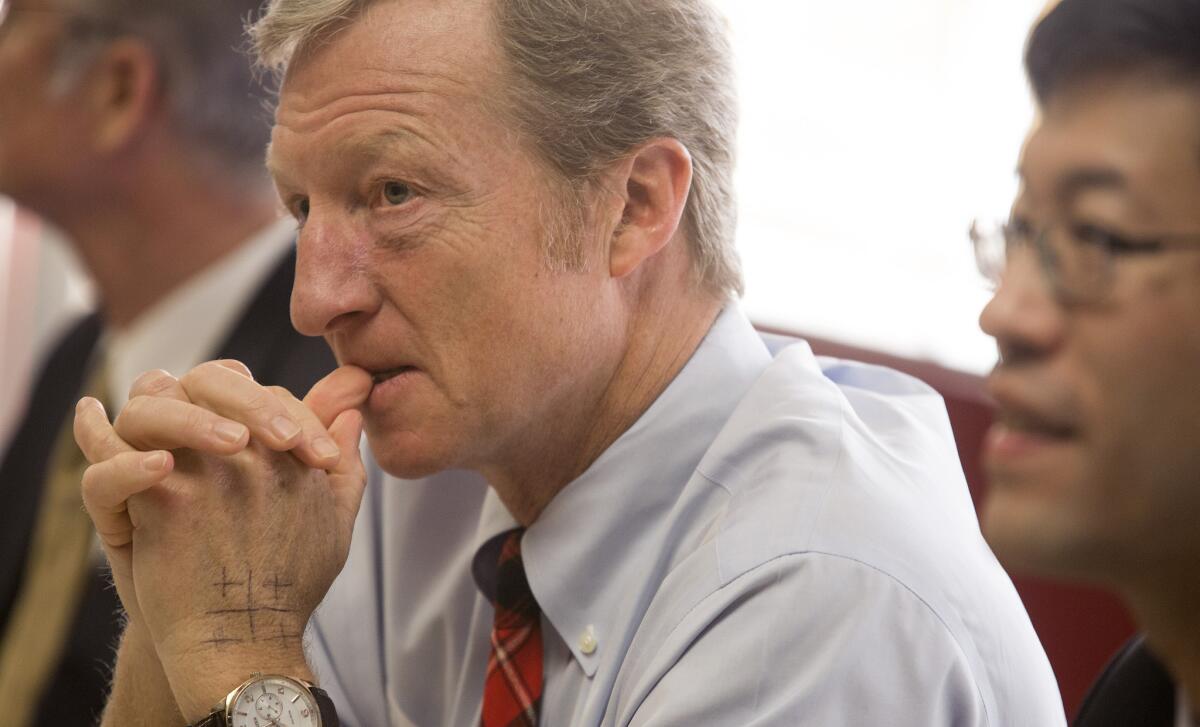
With President Trump in the White House, information about climate change has been disappearing from government websites.
Some fear the same thing could happen with the Environmental Protection Agency. Now the advocacy organization run by environmentalist and political donor Tom Steyer is taking steps to preserve the information.
NextGen Climate copied the website and made it available at SaveOurEPA.com.
“As Americans, we will not allow Donald Trump to erase the truth or rewrite history,” Steyer said in a statement. “This information belongs to the people, and the public has a right to know the truth.”
Trump has taken other steps that have alarmed environmentalists. For example, he greenlighted two oil pipelines that had been stopped by former President Obama.
- Share via
For California, a return to center stage in the 2020 presidential contest
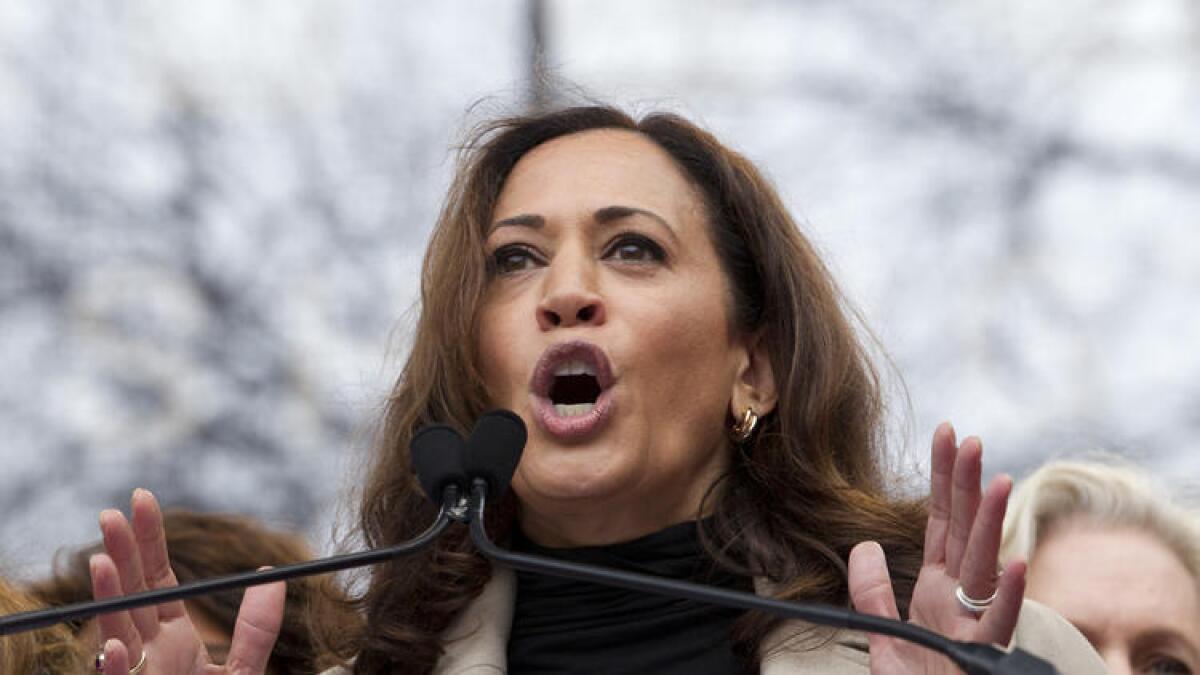
Kamala Harris hadn’t even arrived in Washington to take up her job as California’s spanking-new U.S. senator when the chatter began: Kamala for president!
Never mind her disavowals — “Seriously?” — or the fact that the first balloting of the 2020 race is, at a minimum, 1,000-plus days away. The soul-sapping election of Donald Trump has Democrats desperately looking far, far down the road.
“Usually the candidates start sending signals,” said Jim Demers, a longtime party strategist in New Hampshire, the state that traditionally holds the first presidential primary. “This time I’m hearing activists begging for the race to begin.”
With a wide-open contest (read: not a Clinton or Obama in sight), the list of would-be contenders, real and imagined, is lengthy, even by the prodigious standards of this early stage.
What’s different in 2020 is that California — huge in population, mighty in economic power, desperate to matter in presidential politics — figures to be at the center of speculation in a way it hasn’t for a generation.
- Share via
There’s a major fight on the way over Trump’s plans for ‘sanctuary cities’
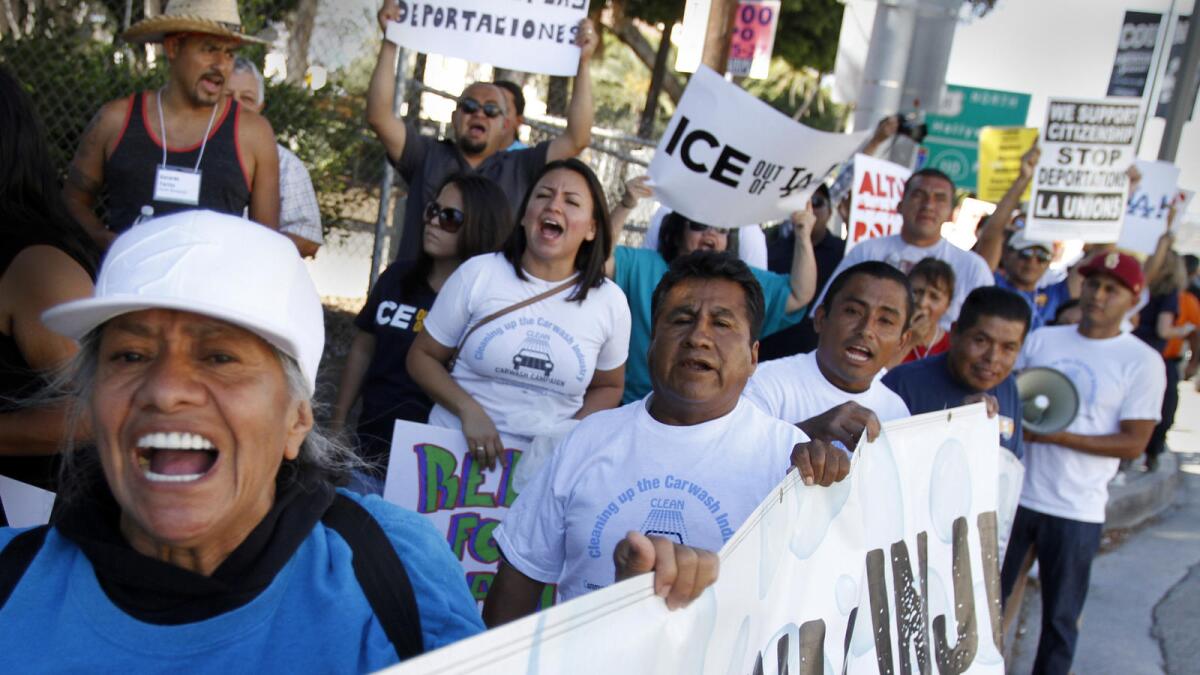
Cities in California are gearing up for a legal fight against President Trump’s plans to take away federal dollars from so-called sanctuary cities.
These cities typically are defined as those that don’t cooperate with federal immigration officials for deportation purposes, and the new president wants to strip them of funding unless they start doing so.
But the language in Trump’s executive order on the issue is vague, and San Francisco officials believe their city is already exempt from the mandate.
- Share via
Fighting Trump’s border wall on environmental grounds probably won’t win in court

California political leaders are seeking all sorts of strategies to fight President Trump’s plans to build a wall along the border with Mexico.
One strategy that’s likely to fail is a lawsuit based on state and federal environmental laws, legal experts said.
Congress already has given the federal government broad authority to waive environmental laws to build a border fence and the courts have upheld that power.
- Share via
‘Calexit’ organizers can now start collecting signatures to get California secession on the ballot
Supporters of the campaign for California to secede from the United States can now begin collecting the hundreds of thousands of signatures they need to get a proposed “Calexit” initiative on the ballot.
California Secretary of State Alex Padilla cleared the proposed initiative to begin collecting signatures on Thursday.
If the measure gets on the ballot and gains approval by a majority of voters, it would repeal clauses in the California Constitution stating that the state is an “inseparable part of the United States” and that the U.S. Constitution is the “supreme law of the land,” according to the title and summary prepared by the state attorney general’s office.
The measure would place another question on the ballot in 2019, asking whether California should become a separate country. If at least half of registered voters participate in that vote, with at least 55% of those voting to approve, the results would be treated as California’s declaration of independence.
The current measure’s fiscal effect is “dependent on various factors,” writes the state’s nonpartisan legislative analyst, and if it succeeds would result in “major, but unknown budgetary impacts.”
The proposal’s backers, known as Yes California, have argued that the state is culturally out of step with the rest of the U.S. and that California pays more money to the federal government than it receives in spending. The election of President Trump has only strengthened their argument, they say.
“California loses [by] being a part of America culturally and financially,” said Marcus Ruiz Evans, one of the group’s founders. “It could be a nation all its own, everybody knows that. The only question is if they want to break off.”
It’s unclear how the group will collect the required 585,407 valid signatures from registered voters over the next 180 days to qualify for the ballot.
A campaign committee, Yes California Independence Committee, has raised no funds so far, according to records from the secretary of state. But Evans says that his group has more than 7,000 volunteers (significantly down from a 13,000 estimate in December) ready to gather signatures and that voters can expect to see signature gatherers on the streets in the next couple of days.
Yes California says that even if the proposed initiative does land on the ballot and voters approve it, such an unprecedented move to secede would need to receive approval of at least a majority of the states in the union, among other legal hurdles.
Evans says he’s not fazed.
“America already hates California, and America votes on emotions,” he said. “I think we’d have the votes today if we held it.”
UPDATE
7:01 p.m.: This post has been updated to clarify that the proposed initiative would place a future vote on California’s secession on the ballot in 2019.
- Share via
Rep. Ted Lieu is trolling Donald Trump, and he hopes you’re watching
Rep. Ted Lieu is now placing an asterisk next to President Trump’s name in news releases.
It’s the Torrance Democrat’s way of drawing attention to his concerns about the new administration, he said.
“Sometimes the best way to respond to crazy is with satire,” Lieu said. “Never before have I had this feeling where our leader is potentially unhinged and has a problem with the truth, and that is highly disturbing for the leader of the free world. So I’ve decided I’m just going to point that out as much as I can.”
The asterisk leads readers to the bottom of the email, where a postscript says:
“ ***In addition to losing the popular vote, Trump — as of January 20, 2017 — is in violation of the Emoluments Clause set forth in Article I, Section 9 of the U.S. Constitution due to massive conflicts of interests and his refusal to put his global business holdings in blind trusts. Trump also benefitted from Vladimir Putin ordering a multifaceted and brazen Russian influence and cyber hacking campaign with the goals of undermining faith in the U.S. democratic process, denigrating Secretary Clinton’s electability, and helping Trump’s election chances. Trump and his press secretary also routinely make stuff up.”
The sophomore congressman said he initially planned to give Trump the benefit of the doubt, hoping his rhetoric was a campaign tactic and that he would pivot to uniting the country following the election. Then Lieu listened to the president’s inaugural speech.
“I was hoping he would govern different than how he campaigned,” he said. “I came to the conclusion that it would be worse for America to normalize him.”
Lieu followed the addition to his news releases with a “Cloud of Illegitimacy Clock” that counts the time since Trump’s swearing-in, which is how long Lieu says Trump has been in violation of the Constitution by not divesting from his businesses or putting them in a blind trust. The Constitution bans government officials from receiving gifts or payments from foreign governments.
Next he posted a series of tweets mocking White House spokesman Sean Spicer for giving incorrect figures on how many people attended the inauguration, and top Trump aide Kellyanne Conway for using the term “alternative facts.”
“I’ve decided that the administration using ‘alternative facts’ is more profane than anything that I could say,” he said. “When the administration lies, they just need to be called out on that. If they are going to lie about stupid little things, like crowd size, imagine what they’re going to say when they roll out their healthcare plan, whenever that might be.”
Lieu has needled Trump in responses to several executive orders this week, including by saying he would bet a “nice bottle of California wine that the Administration will be unable to find a credible witness to testify under oath to the allegation that 3-5 million people illegally cast votes in 2016,” and by mentioning the inauguration crowd while talking about Trump’s proposed border wall.
Lieu said he’s “absolutely” hoping Trump will respond.
“I think satire is an effective way to highlight issues, and I want the American people to see who this president really is, because in 22 months they get to vote again on every member of Congress, and that will be a referendum on Donald Trump,” Lieu said.
- Share via
California Democrats propose adding third, nonbinary gender option for driver’s licenses and other official documents
California driver’s licenses and birth certificates could have a third option for gender in addition to male or female under legislation unveiled Thursday by Democratic lawmakers.
The bill by state Sens. Toni Atkins (D-San Diego) and Scott Wiener (D-San Francisco) would establish a new nonbinary gender marker for official state documents.
Lawmakers framed the measure as an expansion of rights for transgender, intersex and other people who do not identify as male or female.
“It will keep California at the forefront of LGBTQ civil rights,” Atkins said at a Capitol news conference.
The bill, SB 179, also would streamline the process for people to change their gender on such documents. It would remove the requirement that an individual obtain a sworn statement from a physician certifying medical treatment for gender transition. It also would create a process for people younger than 18 to apply for a change of gender on their birth certificate.
Jo Michael, of Equality California, a gay rights advocacy group, said the bill had personal resonance. Michael identifies as transgender and nonbinary.
“For the first time, Californians like me could have accurate gender markers that truly reflect who we are,” Michael said.
Wiener said the proposal places California in stark relief to other states in the country, including North Carolina, where a high-profile law regulating transgender people’s use of public bathrooms roiled the state.
“As the LGBT community — but especially the trans community — is under assault in this country, California needs to go in the opposite direction and embrace the trans community and support the trans community and modernize these laws,” he said.
The legislation does not specify what the alternate gender marker would be, but other countries that have implemented such a policy, such as Australia and New Zealand, have used the letter “X” alongside “M” for male and “F” for female, according to Sasha Buchert of the Transgender Law Center.
Atkins, who is a lesbian and a member of the California Legislative LGBT Caucus, said this proposal marks an “evolution” for her in better understanding the concerns of the transgender and intersex community. She authored a law in 2014 that ensures death certificates reflect a person’s gender identity, an experience she said made her more aware of the bureaucratic hurdles that transgender people often face.
This year’s bill, she said, “is moving us forward into a new world, where acceptance is ... letting people be who they tell you they are.”
- Share via
Former U.S. Atty. Gen. Eric Holder will visit Sacramento to meet with Democratic legislators next month
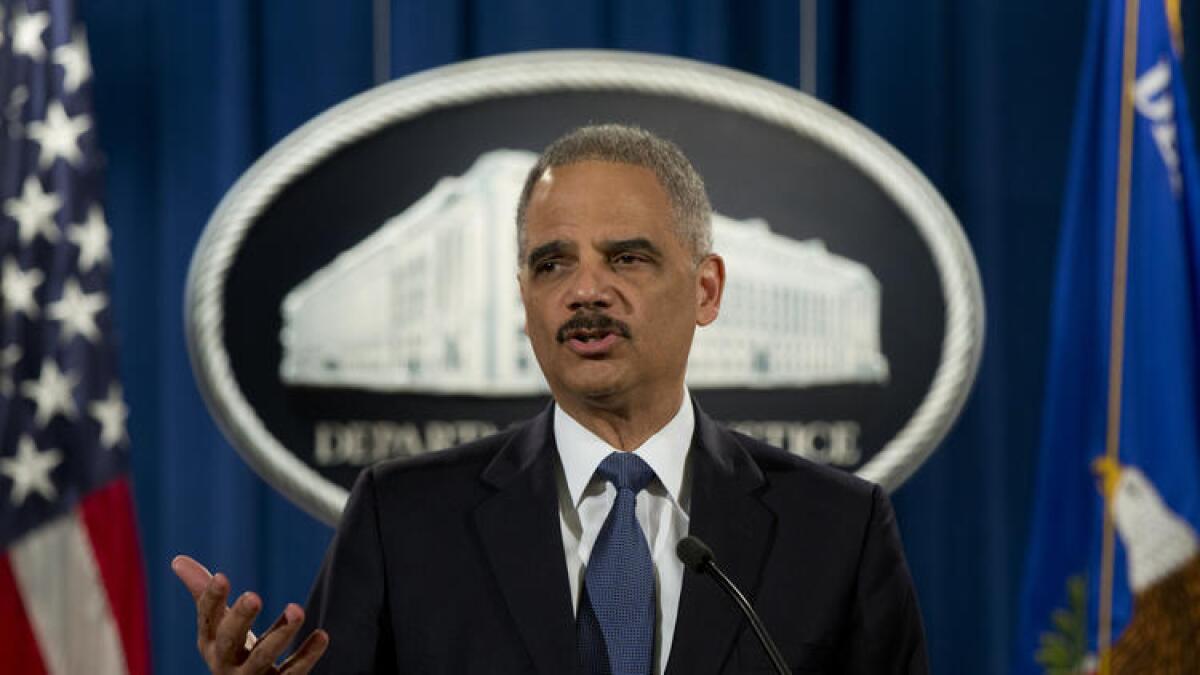
California lawmakers will have a chance to meet the Legislature’s new outside counsel on Feb. 7, when former U.S. Atty. Gen. Eric H. Holder Jr. travels to the state to address Senate and Assembly Democrats.
Holder, leading a team of attorneys from the firm Covington & Burling, has been hired by Senate President Pro Tem Kevin de León (D-Los Angeles) and Assembly Speaker Anthony Rendon (D-Paramount) to serve as outside counsel as the state prepares a legal strategy to deal with the administration of President Trump.
But Senate and Assembly staff officials said his invitation to meet with lawmakers was extended prior to the contract, which begins in February, and that Holder is making the trip on his own personal time. His travel and accommodations expenses will not be paid with state funds, and his appearances will not be part of his billable hours, they said.
Holder will address Senate Democrats at their annual policy retreat, and will speak to the Assembly Democratic caucus. His visit comes soon after state Democratic leaders this week denounced Trump’s executive orders on immigration and pledged to take his administration to court should other legislative means of resistance fail.
- Share via
A guide to the guessing game that is the 2018 California governor’s race
While the race to succeed Gov. Jerry Brown already has attracted a small cadre of well-known Democrats, the behind-the-scenes strategizing, cajoling and guessing games surrounding a handful of other potential contenders could create havoc in what’s expected to be California’s biggest political showdown since 2010.
Among those watching closely are the candidates already definitely in the running, including Lt. Gov. Gavin Newsom, former Los Angeles Mayor Antonio Villaraigosa and state Treasurer John Chiang.
Delaine Eastin, who spent eight years as California’s top education official, announced she was running in November and officially launched her campaign — and fundraising operation — on Thursday.
- Share via
‘This is not a monarchy’: California Senate leader Kevin de León bashes Trump’s immigration orders
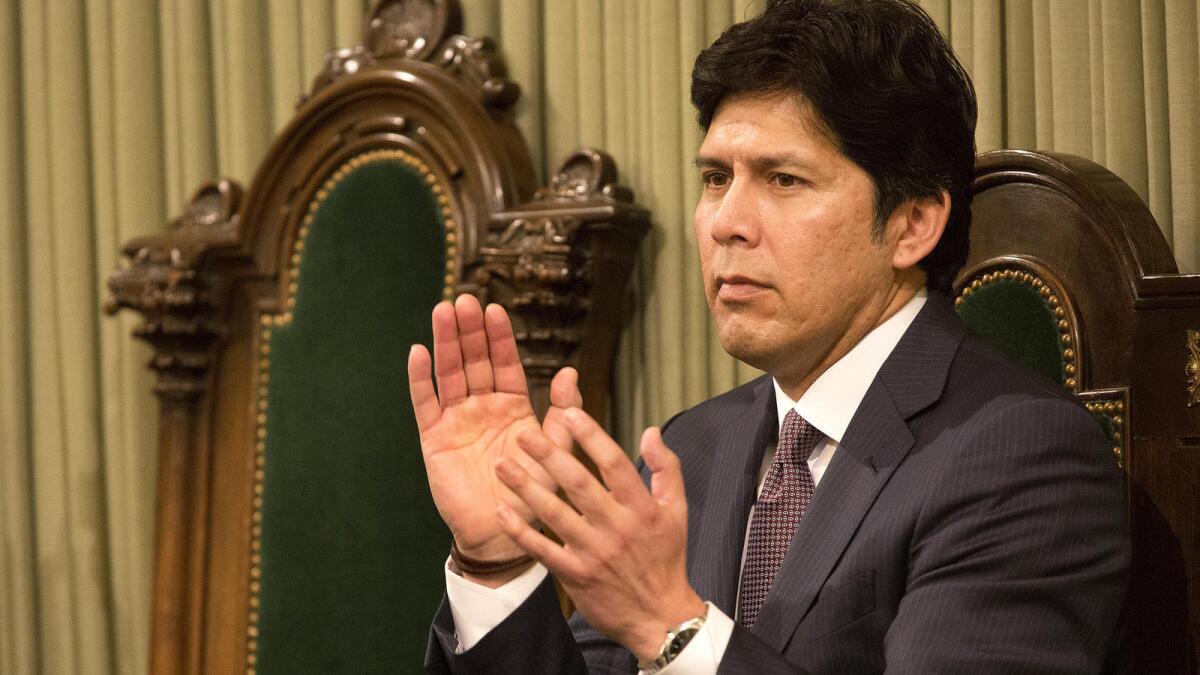
California Senate leader Kevin de León took another shot at President Trump and his executive orders on immigration Wednesday night, calling his threat to withhold federal dollars from so-called sanctuary cities “political blackmail” and “political vengeance.”
In an interview on the MSNBC show “The Last Word with Lawrence O’Donnell,” De León said California was working with former U.S. Atty. Gen. Eric H. Holder Jr. to study all of its legal options to oppose the directives. Under the 10th Amendment, the state Senate leader said, the federal government cannot commandeer and force local municipalities and police agencies from carrying out their work.
The appearance came hours after Trump signed orders to temporarily halt the U.S. refugee program, cut funding for cities that offer immigrants protections and order federal officials to construct a U.S.-Mexico border wall.
“California will not become a cog in the Trump deportation machine,” De León said. “This is not a monarchy, and I know he fancies himself as a king, but this is a republic.”
- Share via
President Trump’s voter fraud allegation is ‘a lie,’ says California’s top elections officer
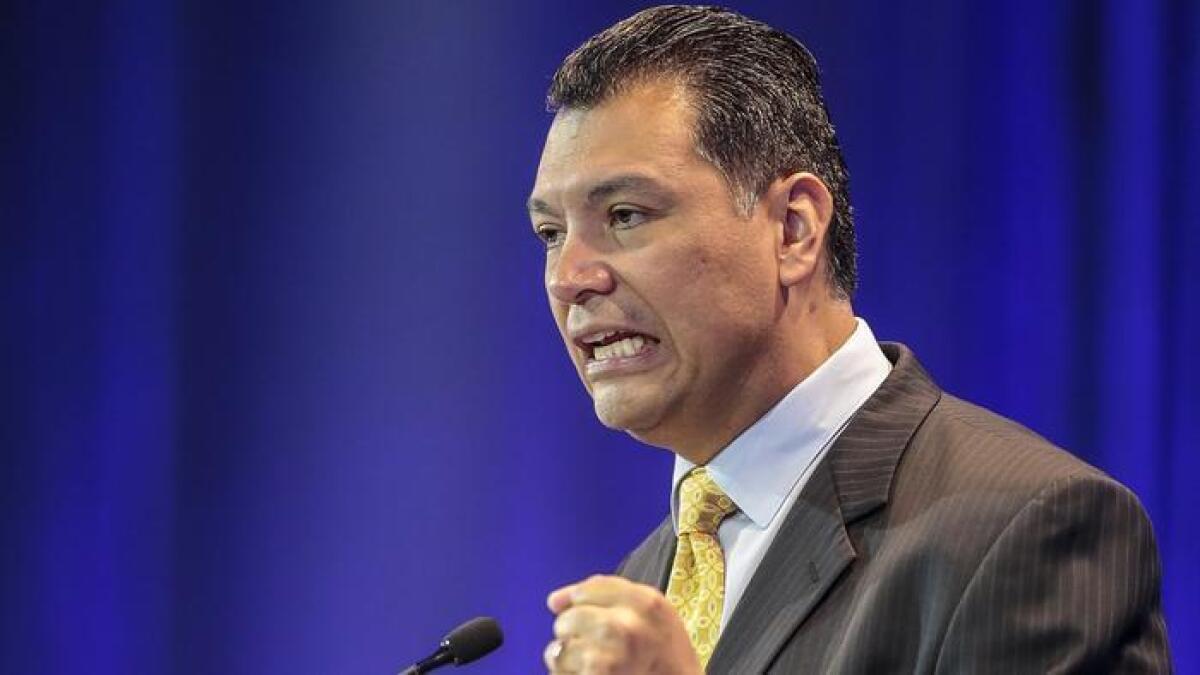
With President Donald Trump rehashing last year’s accusation of widespread voter fraud in California and elsewhere, the state’s top elections official is also restating his take: It’s not true.
“When the president says millions of illegal ballots are cast, that’s simply not the case,” said Secretary of State Alex Padilla in an interview on CNN Wednesday. “It’s a lie.”
As was the case when Trump made the accusation in November, there’s no evidence of such a broad attempt to sway the outcome in California. The president lost the Golden State to Democrat Hillary Clinton by almost 4.3 million votes.
Trump’s announcement on Wednesday of a “major investigation” into voter fraud reignited the issue, even though there was also Republican skepticism in the wake of the new round of accusations.
“Is it a question of millions of people? That’s a pretty steep hill to climb,” said Assemblyman Matthew Harper (R-Huntington Beach), the vice chairman of the Assembly’s elections committee. “You’d have to have a very strong coordinated effort across California to pull that off.”
Harper said he believes the better discussion is whether new, independent audit capabilities need to be in place to examine election results.
Others, though, were sharply critical of the president’s motives.
“Allegations of widespread voter fraud are not just ‘alternative facts,’ they are a calculated and sinister attempt at voter suppression that takes a page from this nation’s bleak history of segregation,” said Laphonza Butler, president of the state council of the Service Employees International Union.
In the CNN interview, Padilla said he worried the president was sowing doubt in an effort to legitimize efforts such as a purging of voter rolls.
“I hope that it’s not a sign of things to come,” he said.
- Share via
Save the dates: Special election set in congressional race to replace Xavier Becerra
The race is officially on in the 34th Congressional District, after Gov. Jerry Brown officially set the date for a special election to replace former Rep. Xavier Becerra, who resigned Monday to become California’s attorney general.
The primary election will take place on April 4, according to a proclamation Brown issued Wednesday afternoon.
If no candidate receives more than 50% of the vote, a general election will be held June 6.
The election dates are separate from two already scheduled municipal elections on March 7 and May 16 in Los Angeles, which encompasses nearly the entire district.
This could heighten concerns about low voter turnout for an off-year election. At least 18 candidates have already stated their intention to run to replace Becerra, who had been in office for 24 years.
- Share via
‘Medieval policy that no longer works today’: California legislators sound off on Trump’s immigration plans
- Share via
‘This isn’t who we are’: What California House members are saying about Trump’s dramatic immigration orders
California’s congressional delegation responded largely with dismay Wednesday to President Trump’s executive orders to begin building a wall along the country’s southern border, cut off funding for cities that don’t comply with federal immigration enforcement officials and expand lockup facilities for those caught entering the country illegally.
Rep. Linda Sanchez of Whittier, vice chair of the House Democratic Caucus, called Trump’s plans for a wall “absurd” and “reckless,” and said Americans will end up footing the bill, not Mexico as Trump insists.
“This is a waste of everyone’s time and money, and does not address the fundamental need for comprehensive reform to fix our broken immigration system. If history has taught us anything it is that walls are expensive, unnecessary and people ultimately find ways around them,” she said in a statement.
Rep. Zoe Lofgren (D-San Jose), a former immigration attorney, dismissed the idea that a wall will keep people out, making reference to the Great Wall of China.
Rep. Scott Peters (D-San Diego), whose district is near the southern border, said Trump doesn’t understand that tens of thousands of jobs in San Diego, and millions around the country, depend on border trade with Mexico.
“In San Diego, we see the border as an opportunity, not a threat, and we know that a wall isn’t the answer. This money would be better spent on modernizing infrastructure and hiring staff at our border crossings to make the screening of cargo and travelers more efficient and secure,” he said in a statement.
House and Senate Republicans are in Philadelphia for an annual retreat. Only one of California’s 14 Republican House members went on record as favoring the president’s orders in the hours after they were announced.
- Share via
Intelligence committee led by Californians investigating Russian influence in 2016 election
The House Select Intelligence Committee is examining allegations that the Russian government tried to influence the 2016 election, Republican Chairman Rep. Devin Nunes and ranking Democrat Rep. Adam Schiff said in a statement Wednesday.
The two Californians said the committee is looking at Russian cyber activity and “other active measures” directed against the U.S. It also will examine links between Russia and people working for political campaigns as well as the federal response to Russia, including leaks of classified assessments from the intelligence community.
The statement does not specifically mention President Trump, the assessment of the U.S. intelligence community that Russia attempted to intervene in the presidential election to ensure he would win or news that Trump’s national security advisor was in frequent contact with the Russian ambassador as President Obama was considering sanctions against Russia.
“This issue is not about party, but about country. The Committee will continue to follow the facts wherever they may lead,” the statement said.
The Senate Intelligence Committee, on which Sen. Dianne Feinstein (D-Calif.) serves, also is investigating Russian interference in the election, and the U.S. response.
Two Republican senators have joined a number of House and Senate Democrats, including House Select Intelligence Committee member Eric Swalwell (D-Dublin) in pushing for a nonpartisan independent commission to examine the issue.
Nunes, who served on Trump’s transition committee, has previously said he doesn’t think an independent commission is necessary.
The statement also asked the new, Trump-appointed heads of intelligence agencies to bring documents requested by the committee directly to committee members.
“It will not be adequate to review these documents, expected to be in the thousands of pages, at the agencies. They should be delivered to the House Intelligence Committee to provide members adequate time to examine their content,” it states.
- Share via
No stamp, no problem: Lawmaker says postage-paid ballots should be available to all Californians
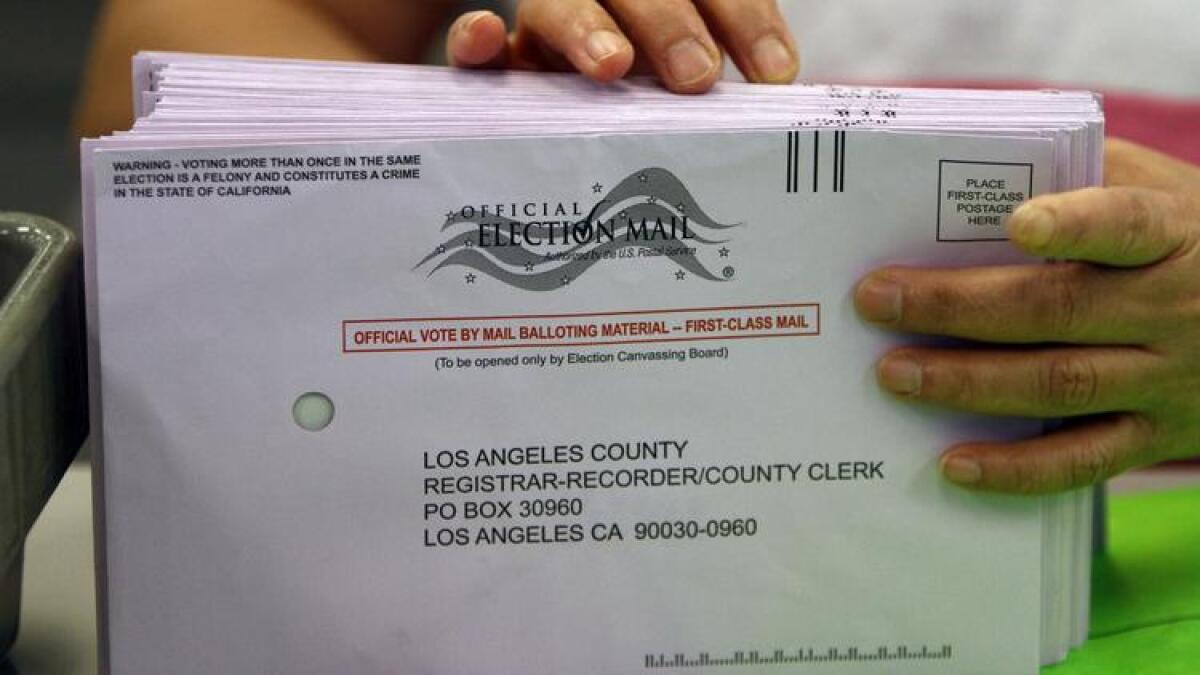
California voters would no longer have to scrounge around in search of a stamp to mail in their ballot under new legislation introduced this week at the state Capitol.
“We want to make sure voters don’t have any barriers,” said Assemblywoman Lorena Gonzalez Fletcher (D-San Diego), the bill’s author.
Ballot envelopes sent by elections officials would be marked as “prepaid postage” and the postage costs would be paid for by individual counties. A key question will be the cost for mailing in as many as 10 million ballots statewide. Not all ballots will weigh the same, given the numerous city and county measures that also are considered in regularly scheduled elections.
The initial language of Assembly Bill 216 doesn’t offer specifics on reimbursing counties, though Gonzalez Fletcher said she expects the proposal’s ultimate cost could be under $2 million, if the law also makes clear that voters can still place a stamp on their ballot.
Regardless, postage fees are likely to be deemed a mandated cost that state government must cover.
Gonzalez Fletcher said the advent of email and online bill-paying services have meant that fewer voters have stamps readily available, with busy working Californians scrambling just to find the time to exercise their right to vote.
“It starts to feel like a very small poll tax,” she said.
The proposal is another example of the steady evolution of elections conducted less by the ballot box than the mailbox in California, as more than half of all registered voters now permanently receive absentee ballots. A number of the state’s most populous counties are expected to soon embrace a sweeping new law shifting elections away from neighborhood polling places and toward a substantial number of votes being cast by mail.
“This is welcome legislation,” said Kim Alexander, president of the nonpartisan California Voter Foundation. “Requiring voters to pay for ballot postage sends a message that the government is putting up obstacles to make it more difficult to vote.”
In many cases, ballots placed in the mail without proper postage are already being delivered by the U.S. Postal Service. Some counties in California have offered prepaid postage in the past, but the vast majority have not.
- Share via
State legislators react to Trump’s immigration executive orders
- Share via
California improves grades from anti-smoking group with barrage of anti-tobacco laws
California led other states in adopting a flurry of new laws restricting tobacco products last year, resulting in a big improvement in the state’s grades from the American Lung Assn.
In a report released Wednesday, the health group boosted the state’s grade for the level of tobacco taxes from an F last year to a B, in recognition that California voters in November approved a $2-per-pack increase in the cigarette tax.
The Legislature last year also adopted a half-dozen new laws, including an increase in the minimum age for smoking from 18 to 21 and an expansion of a smoking ban in public places, including restaurants and theaters, to also include use of electronic cigarettes.
The state’s grade for “smoke-free air policies” rose from a B to an A, while California received a B for restricting tobacco to young people.
The group gave the state an “incomplete” for funding of tobacco prevention programs because officials have not yet started collecting money from the tobacco tax increase in Proposition 56.
“In 2016, Californians fought back against Big Tobacco’s grip on our state,” said David Pogue, chairman of the American Lung Assn. in California’s governing board. “Tobacco-related illnesses remain the single most preventable cause of disease and death in California, and we’re proud to reaffirm ourselves as a national leader in the effort to reduce smoking rates and exposure to secondhand smoke and to protect our children from a lifetime of addiction.”
The group cited the lack of significant new tobacco laws passed in Los Angeles for its decision to leave the city’s C grade unchanged. El Monte and West Hollywood passed some new tobacco policies and raised their grades. Santa Ana earned a C, but was at top of the list in Orange County, where almost all the other cities received Fs, officials said.
- Share via
California Rep. Lou Correa urges Trump to restore Spanish-language version of White House website
Freshman Rep. Lou Correa (D-Santa Ana) asked President Trump in a letter Wednesday to reinstate the Spanish-language version of the White House website.
An aide to the president said Tuesday that a Spanish-language version of the page would be available at some point.
Correa’s spokesman, Andrew Scibetta, said the congressman wants to make sure it’s moving forward.
“In development is not the same as online. We want to make sure this actually happens, and doesn’t get stuck in indefinite development,” he said.
Correa represents California’s 46th Congressional District, in which more than half of residents speak Spanish at home, according to the U.S. Census Bureau’s 2015 American Community Survey.
The Trump administration took over the site on Friday, the day he was inaugurated. Among other changes, it no longer includes an option for translation into Spanish or an option that gave information about access for disabled users.
- Share via
Sen. Kamala Harris pushes Trump’s budget director pick on timely disaster relief
Sen. Kamala Harris (D-Calif.) pushed President Trump’s budget chief pick Tuesday on whether he’d advise the new Republican leader to offer timely disaster relief, especially to states like California that face earthquakes, fires, floods and other natural disasters.
“Can you assure me that when natural disasters hit various parts of the country like California, that you will be willing to put the immediate interests of people in need as the first priority for you, or will you insist that the budget cuts be made before agreeing to provide critical assistance to those victims?” Harris asked Rep. Mick Mulvaney during a confirmation hearing Tuesday.
The South Carolina Republican asked for spending cuts to offset billions in relief funding after Hurricane Sandy hit the East Coast.
“There is a proper federal role in dealing with natural disaster relief,” Mulvaney said in response to Harris’ questioning. “Sandy is a tremendous example of something so large, it’s simply too large for one state or local government to deal with, it is an appropriate function of the federal government.”
Harris pushed a second time, “So can you assure me that if a natural disaster hits other states, like California for example, that you will not hold up relief for the state, waiting to determine whether there are going to be budget cuts or cuts in order to provide that relief? Or are you going to sit back and crunch the numbers while people are waiting for help?”
Mulvaney replied, “No, I see my role in that particular circumstance as advising the president. Mr. President, here’s what we’ve done it in the past, here’s how it worked out, here’s how I think we should proceed in this circumstance and here’s why. And then whatever the president says to do, I will enforce.”
Harris is still weighing how to vote on Mulvaney’s confirmation, her staff said.
- Share via
Trump is a hot topic in California’s race for governor, but not in a good way
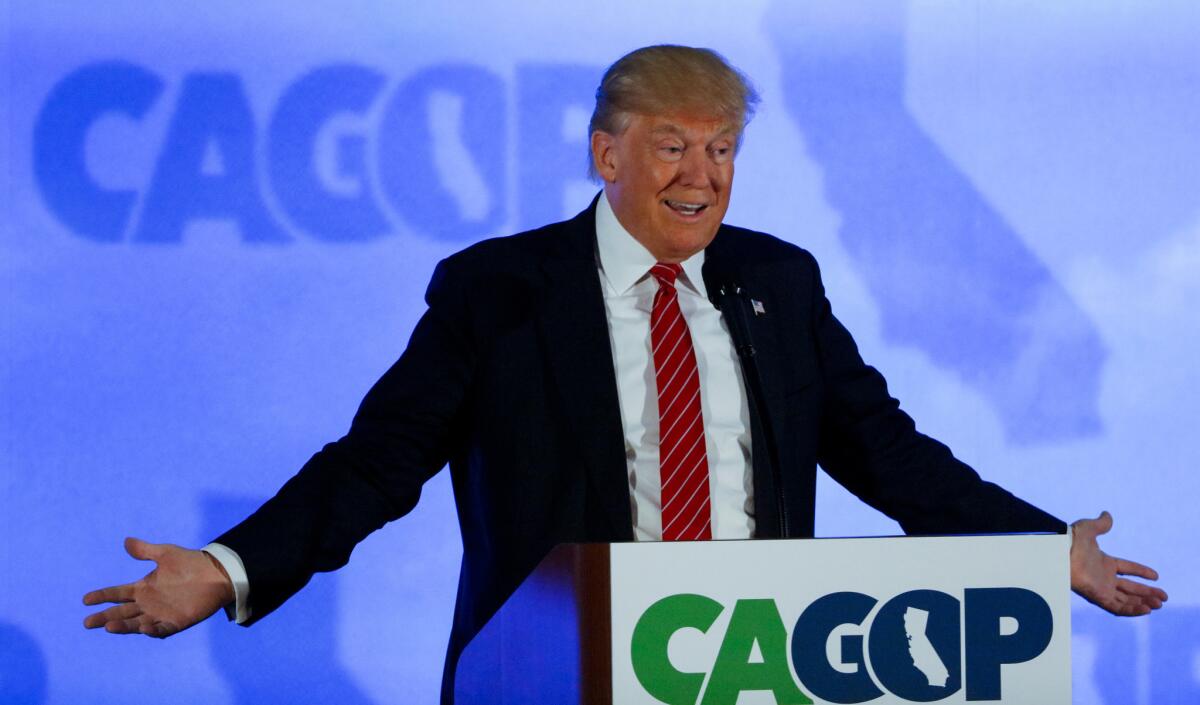
One of the most talked about politicians in California’s 2018 governor’s campaign isn’t even running.
Rarely does a day go by when Republican President Donald Trump isn’t used as a political piñata by one of the top Democrats in the race.
Lt. Gov. Gavin Newsom took some jabs Tuesday when he addressed the California Legislature before Gov. Jerry Brown’s annual State of the State speech. Newsom mocked the Trump administration for its reliance on “alternative facts” — a phrase used by a Trump senior advisor when defending inflated inauguration crowd figures — and took a subtle shot at the president’s comment about “American carnage” in the nation’s cities.
On Monday, state Treasurer John Chiang criticized Trump for doubting the scientific evidence of climate change.
“President Trump may believe global warming was created by and for the Chinese in order to make U.S. manufacturing noncompetitive,’’ Chiang said. “We Californians stand with the scientific community and the 195 nations that have declared climate change is an urgent and potentially irreversible threat to human societies and the planet.”
When Antonio Villaraigosa announced his bid for governor right after the general election, the former Los Angeles mayor was sure to include a dig at Trump.
“I’m running because I think the answer to the divisiveness we see in the country right now is unity, and the answer to fear is hope,” he said.
Last May, Villaraigosa compared Trump to segregationist George Wallace.
California’s former superintendent of public instruction, Delaine Eastin, last week ripped Trump for nominating Betsy DeVos for Education secretary. Eastin said DeVos, a charter school advocate and Republican fundraiser from Michigan, was a threat to public education in the country.
In speeches, in fundraising emails, in tweets and Facebook posts, the Democrats have liberally excoriated Trump while largely avoiding lobbing any criticism at one another. It’s a safe and easy tactic that appeals to a sizeable majority of voters in left-leaning California.
In the November election, Trump was trounced by Democratic presidential nominee Hillary Clinton in California — losing to her by more than 4.2 million votes.
San Diego Mayor Kevin Faulconer, a Republican being urged to run by fellow party members, has also rebuked Trump in the past.
In May, Faulconer said he rejected Trump’s “divisive rhetoric” about women and immigrants. Faulconer was absent at Trump’s inauguration and skipped a Trump campaign rally in San Diego last spring.
For any Republican to have a legitimate shot in the governor’s race, or any statewide election, the more distance they put between themselves and Trump the better, said GOP political consultant Rob Stutzman.
“It’s important that you’re not on the record gushing about Trump,” Stutzman said.
3:30 p.m.: This story was updated to correct the title of Delaine Eastin. She is a former state superintendent of public instruction.
- Share via
California’s House members vote along party lines on permanently banning federal funds for abortion
California’s House delegation split along party lines Tuesday on a bill to permanently prohibit the use of certain federal funds for abortions.
President Trump promised the anti-abortion community during the campaign that he would make the funding ban — commonly called the Hyde Amendment — permanent.
It passed the House 238-183 and goes next to the Senate. The 52 members who represent California in the House split along party lines, with 36 Democrats against for it, and 14 Republicans voting for it. Reps. Ted Lieu (D-Torrance) and Jim Costa (D-Lieu) did not vote. Their staffs each said the member would have joined Democrats in voting against the measure.
If passed by the Senate, it would permanently prohibit federal funding from being used to cover abortion costs except in cases of rape, incest or if the mother’s life is in danger. It effects government employee’s health plans, Medicaid and health insurance plans offered under the Affordable Care Act.
The amendment has been added to the annual appropriations bill for the past 40 years and the bill approved by the House Tuesday would make it permanent.
During debate on the House floor Rep. Judy Chu (D-Monterey Park) called the bill a “women’s health catastrophe” that will keep poor women on Medicaid or the Affordable Care Act from having access to insurance.
“In effect it makes abortion only an option for the wealthy,” she said.
Previous versions of the bill twice passed the House but were not considered by the Senate while President Obama was in office.
11:09 a.m. Jan. 25: An earlier version of this article reported that Democrats voted for the bill and Republicans voted against the bill. It was the opposite.
- Share via
California lawmakers to weigh whether younger children should be allowed to testify in custody cases
California lawmakers will weigh whether family courts should allow children as young as 10 to testify before judges regarding parent custody or visitation rights.
A bill filed by state Sen. Connie Leyva (D-Chino) would lower the current threshold from age 14 to enable more children to express their wishes in court, some of whom she said could find themselves in life-threatening situations.
The legislation was co-sponsored by the California Protective Parents Assn. and the Center for Judicial Excellence. Neither current law nor the bill would require children to testify in family cases unless they choose to.
In a statement, Levya called the proposal an important child safety measure.
“As a family court makes critical life decisions for children, it makes sense for them to be granted a greater voice in court proceedings since they can contribute essential information before final decisions are made,” she said.
- Share via
Support for California secession is up, one poll says

Californians’ support for a breakaway California republic has increased, one poll has found.
One-third of state residents support peacefully seceding from the United States, up from 20% since Californians were last asked the same question in 2014, according to a new Reuters/Ipsos opinion poll. The poll’s margin of error for the California answers was plus or minus 5 percentage points.
Still, half of Californians opposed the idea of succession, though Democrats were more inclined to support it than Republicans. The survey found that 60% of Republicans gave the idea of peacefully seceding a thumbs down compared with 48% of Democrats and 50% of independents.
Nationally, 22% of those polled supported having their state break away from the U.S., according to the survey.
A “Calexit” campaign already is underway to make California an independent nation. The effort faces extremely long odds.
The poll surveyed 14,000 adults nationwide, and 500 in California, from Dec. 6 to Jan. 19.
- Share via
Skelton on Gov. Brown’s State of the State address: ‘Most fiery’ speech to date
- Share via
Gov. Jerry Brown defiantly tells lawmakers ‘California is not turning back’ in face of Trump and GOP proposals
Gov. Jerry Brown used his State of the State speech on Tuesday to promise a forceful defense of California’s efforts on climate change, healthcare and assistance to those in the country illegally against new proposals by President Donald Trump and national Republican leadership.
“California is not turning back,” Brown said to applause. “Not now, not ever.”
The governor’s remarks, delivered in front of lawmakers and state elected officials in the Assembly chambers, came just four days after President Trump’s forceful inaugural address that signaled a dramatic new course for the federal government.
While he never mentioned the president by name during the 16-minute speech, Brown said there are “disturbing” signs as to what’s on the horizon.
“We have seen the bald assertion of ‘alternative facts,’ whatever those are,” he said, a reference to top Trump advisor Kellyanne Conway’s weekend comments on NBC’s “Meet the Press.” “We have heard the blatant attacks on science. Familiar signposts of our democracy — truth, civility, working together — have been obscured or swept aside.”
The annual event in the chamber of the state Assembly was unusual from the outset. Just minutes before beginning his speech, Brown gave the oath of office to Atty. Gen. Xavier Becerra, the former Los Angeles congressman confirmed to the post on Monday afternoon by the state Senate.
Legislators have had a decidedly unusual start to their new two-year session. After a raucous opening day in December that laid bare wounds from the presidential race, lawmakers were presented two weeks ago with Brown’s projection of a $1.6-billion budget deficit looming on the state’s fiscal horizon.
But the sea change in national politics has been a persistent buzz in the state Capitol, and Brown promised a strong defense of California’s unique view on major policy issues.
The governor made a special mention of the issue of illegal immigration, offering perhaps his strongest words to date.
“Let me be clear,” the governor said, his voice rising. “We will defend everybody — every man, woman and child who has come here for a better life and has contributed to the well-being of our state.”
Even with those critiques, the governor veered from his prepared remarks to praise Trump’s call for a new focus on infrastructure projects.
“I say, ‘Amen to that, man!’ ” he said.
And Brown urged members of the Legislature to reject the bitter partisan divisions of this moment in the nation’s history.
“Democrats are in the majority, but Republicans represent real Californians, too,” he said to bipartisan applause. “We have generally been civil to one another and avoided the rancor of Washington. I urge you to go even further and look for new ways to work beyond party and act as Californians first.”
- Share via
Governor ends State of the State address by saying California’s ‘truth is marching on’
- Share via
Gov. Jerry Brown says Planned Parenthood has been ‘unfairly attacked’
- Share via
Governor defends Planned Parenthood in State of the State address
- Share via
Gov. Jerry Brown promises to protect immigrant rights
Let me be clear: We will defend everybody -- every man, woman and child -- who has come here for a better life and has contributed to the well-being of our state.
— Gov. Jerry Brown, speaking on immigration in his State of the State speech
- Share via
Gavin Newsom: California is the ‘antidote’ to federal politics
- Share via
Xavier Becerra takes oath of office, is first Latino to become California attorney general
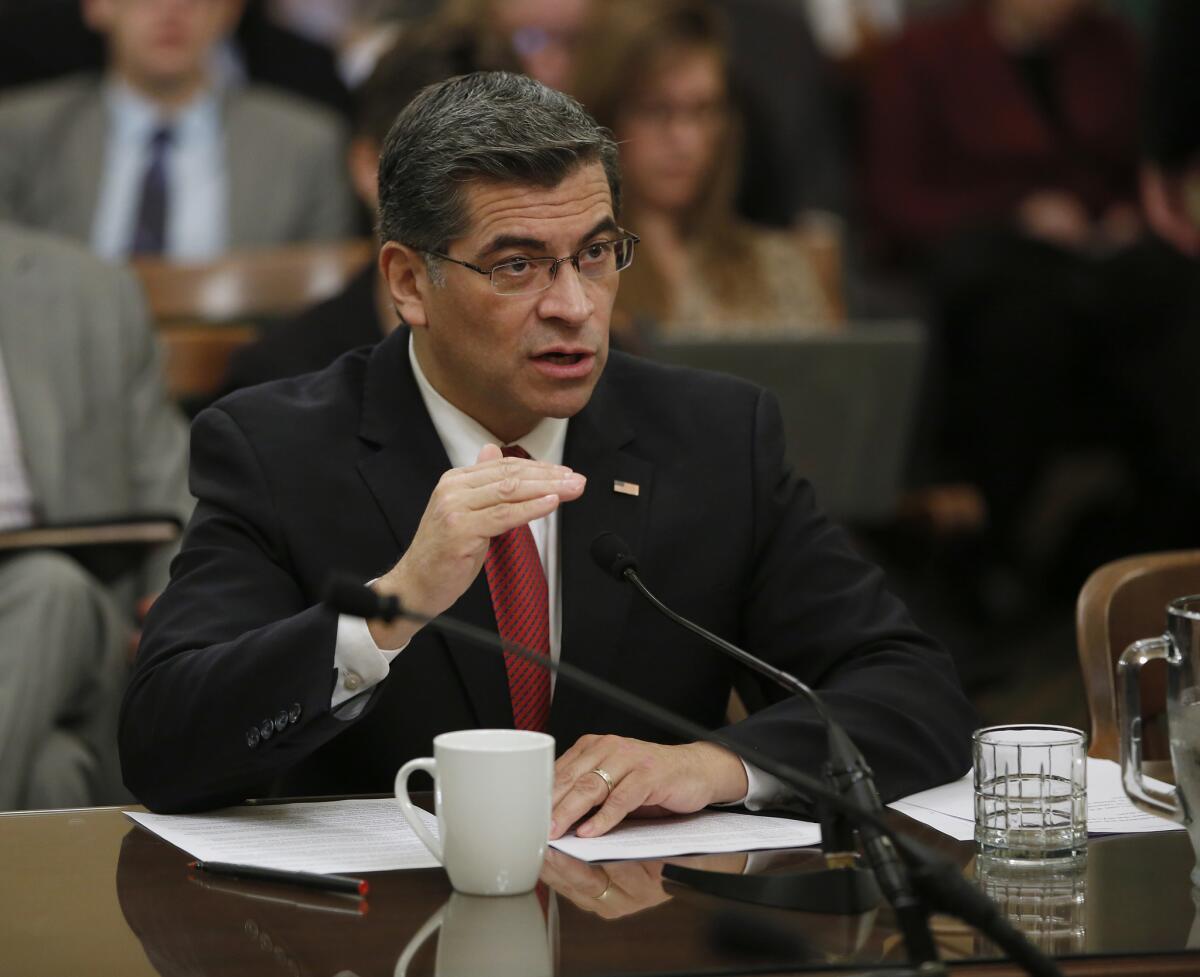
Minutes after resigning his seat in Congress on Tuesday, Xavier Becerra took the oath of office as California’s new attorney general, and he immediately made plans for a sit-down with sheriffs from throughout the state to talk about law enforcement issues.
Becerra, 58, was given the oath of office at the Capitol by Gov. Jerry Brown, who predicted earlier that “Xavier will be a champion for all Californians.” The ceremony was held before Brown was scheduled to deliver his annual State of the State address, and a day after Becerra received final confirmation by the state Senate.
“I will do my utmost to uphold your faith in me to serve as our great state’s next chief law enforcement officer and legal advocate,” Becerra said in a letter to Brown on Tuesday, letting him know he had resigned from Congress.
“And while I leave Congress with mixed emotions, I am ready to begin my work as Attorney General. California’s hard-working families are counting on us, and we won’t let them down,” Becerra said.
Becerra was accompanied at the ceremony by his wife, physician Carolina Reyes, two of his three daughters, and his parents, both immigrants from Mexico.
Brown appointed Becerra to fill a vacancy after former Atty. Gen.l Kamala Harris won election to a seat in the U.S. Senate.
Becerra has pledged to challenge any attempts by the new administration of President Trump to roll back state policies on immigration, civil rights and the environment.
Brown noted his appointee’s background during his speech.
“Like so many others, he is the son of immigrants who saw California as a place where, through grit and determination, they could realize their dreams,” Brown said. “And they are not alone, millions of Californians have come here from Mexico and a hundred other countries, making our state what it is today: vibrant, even turbulent, and a beacon of hope to the rest of the world.”
The first Latino to become state attorney general in California spent the last two weeks meeting with dozens of legislators as he went through confirmation hearings in both houses.
“Governor Brown and state legislators have already shared valuable ideas on our path forward,” Becerra said in a statement after his confirmation. “And next week I hope to sit down with sheriffs from across our state to begin our work together keeping our families safe and enforcing our laws fairly.”
The first focus on local law enforcement was welcomed by Kern County Sheriff Donny Youngblood, president of the California State Sheriffs’ Assn.
“He wants to start with law enforcement in the San Joaquin Valley, and I think that’s a really positive step,” Youngblood said. “I’m impressed with his credentials. I’m impressed with his background, and I think he’s going to be a good attorney general.”
- Share via
Xavier Becerra is officially sworn in as California’s new attorney general
- Share via
Governor’s aide references Woody Guthrie in State of the State preview
- Share via
Watch: Gov. Jerry Brown delivers his State of the State address
Gov. Jerry Brown will deliver his State of the State address at 10 a.m. PST. Watch live here:
- Share via
A tribute to the governor’s late dog before the State of the State speech
- Share via
Xavier Becerra’s resignation from Congress took effect at 9:15 a.m.; he calls serving a ‘distinct honor’
- Share via
California’s senators split on CIA director confirmation
California’s senators split Monday night on the confirmation of Rep. Mike Pompeo (R-Kan.), President Trump’s pick to lead the CIA.
Sen. Dianne Feinstein (D-Calif.), who serves on the Senate Select Intelligence Committee and backed Pompeo, said in a statement that Pompeo gave straightforward answers to her questions, and that House colleagues called him “smart, hardworking and devoted to protecting our country.”
“Congressman Pompeo has committed to following the law regarding torture, promised to provide objective analysis of Iran’s compliance with the nuclear agreement and insisted that he would continue to keep the Senate Intelligence Committee fully informed of CIA activities,” Feinstein said.
Sen. Kamala Harris (D-Calif.) said in a statement that she appreciated that Pompeo was “responsive, engaging, and has made a number of positive commitments” during the confirmation process, but said she couldn’t vote for him after looking at his entire “record on issues such as torture, surveillance, and the collection and use of metadata.”
Pompeo was confirmed 66 to 32 Monday evening. Thirteen Democrats joined Feinstein in voting for him.
While House members don’t get to vote for confirmation, the leaders of the House Select Intelligence Committee, Chairman Rep. Devin Nunes (R-Tulare) and ranking Democrat Rep. Adam Schiff (D-Burbank) joined Feinstein in congratulating Pompeo for his confirmation.
- Share via
Sen. Kamala Harris moves into some familiar digs on Capitol Hill
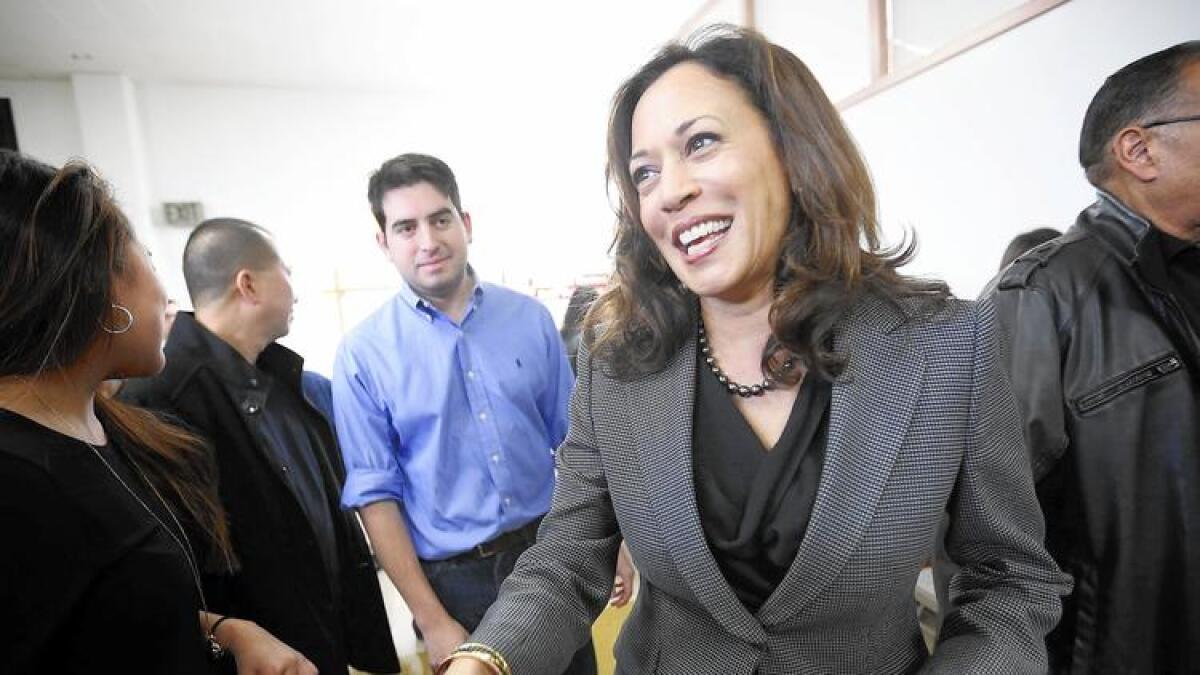
Sen. Kamala Harris (D-Calif.) and her staff can begin moving today into her official Senate office, the same space she interned in as a college student.
Few offices can hold a staff as large as the ones allocated to the California members and as expected, Harris was assigned an office in the Hart Senate Office Building, the same space occupied by former Sen. Barbara Boxer (D-Calif.). Harris can start moving in this morning, her staff said.
Back home, Harris plans to have state offices in Fresno, Los Angeles, Sacramento, San Diego and San Francisco, her staff said.
It is a bit of a change from Boxer, who had additional offices in Oakland and Riverside, but did not have an office in San Francisco.
The space in Washington should feel familiar. It was occupied by Sen. Alan Cranston (D-Calif.) when Harris interned for him as a mailroom clerk for a summer when she was a Howard University student in the 1980s.
Two floors up in the same building is Sen. Dianne Feinstein (D-Calif.).
Except for states where staff size is a consideration, Senate offices are assigned based on seniority and sitting senators have months to decide if they want to move offices. That means some new senators could spend months working out of temporary space.
- Share via
Assembly speaker taps former Obama spokesman for communications strategy
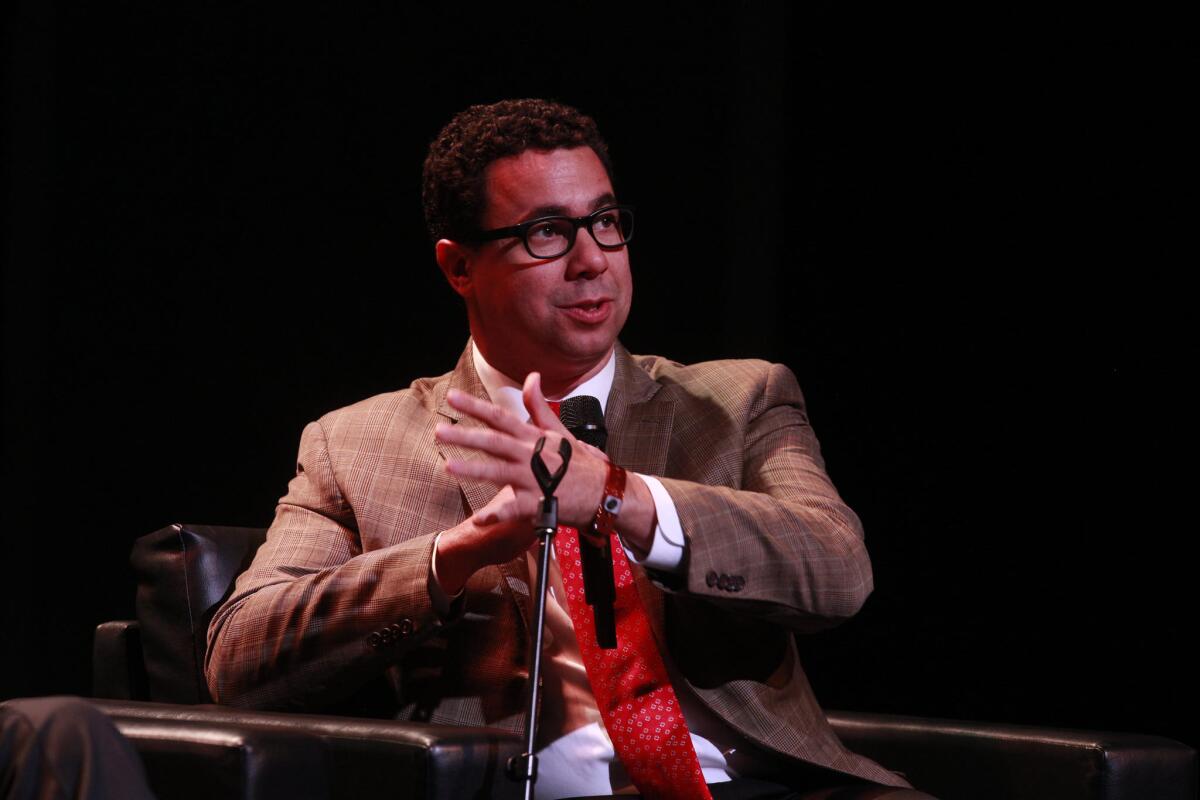
With California’s face-off against Washington, D.C., getting widespread attention, Assembly Speaker Anthony Rendon has turned to a veteran of national politics to help shape his public image: White House veteran Bill Burton.
Burton, who once worked as deputy press secretary in the Obama administration, was hired this month by Rendon, a Democrat from Paramount, for communications strategy.
Now a managing partner in the Los Angeles office for SKDKnickerbocker, a prominent liberal public affairs firm, Burton said he relished being involved in California politics, which he said sets a model for liberals nationwide.
“With President Trump and congressional Republicans controlling the national agenda, Speaker Rendon and his incredible staff are at the center of some of the most important progressive fights in the country and we couldn’t be more excited to be helping any way we can,” he said.
Burton said his services, paid for out of Rendon’s campaign account, are meant to offer a “more intentional approach to how he’s been dealing with media” — a recognition, he said, of Rendon’s and California’s “elevated role” in national politics.
Rendon is not the only legislative Democrat to be represented by SKDKnickerbocker. Assemblywoman Cristina Garcia of Bell Gardens also is a client. The firm also worked with Democratic Reps. Grace Napolitano and Linda Sanchez in their reelection bids, as well as freshman Rep. Nanette Barragan in her heated congressional race against fellow Democrat, former state Sen. Isadore Hall.
- Share via
State Senate votes for final confirmation of Xavier Becerra as state attorney general
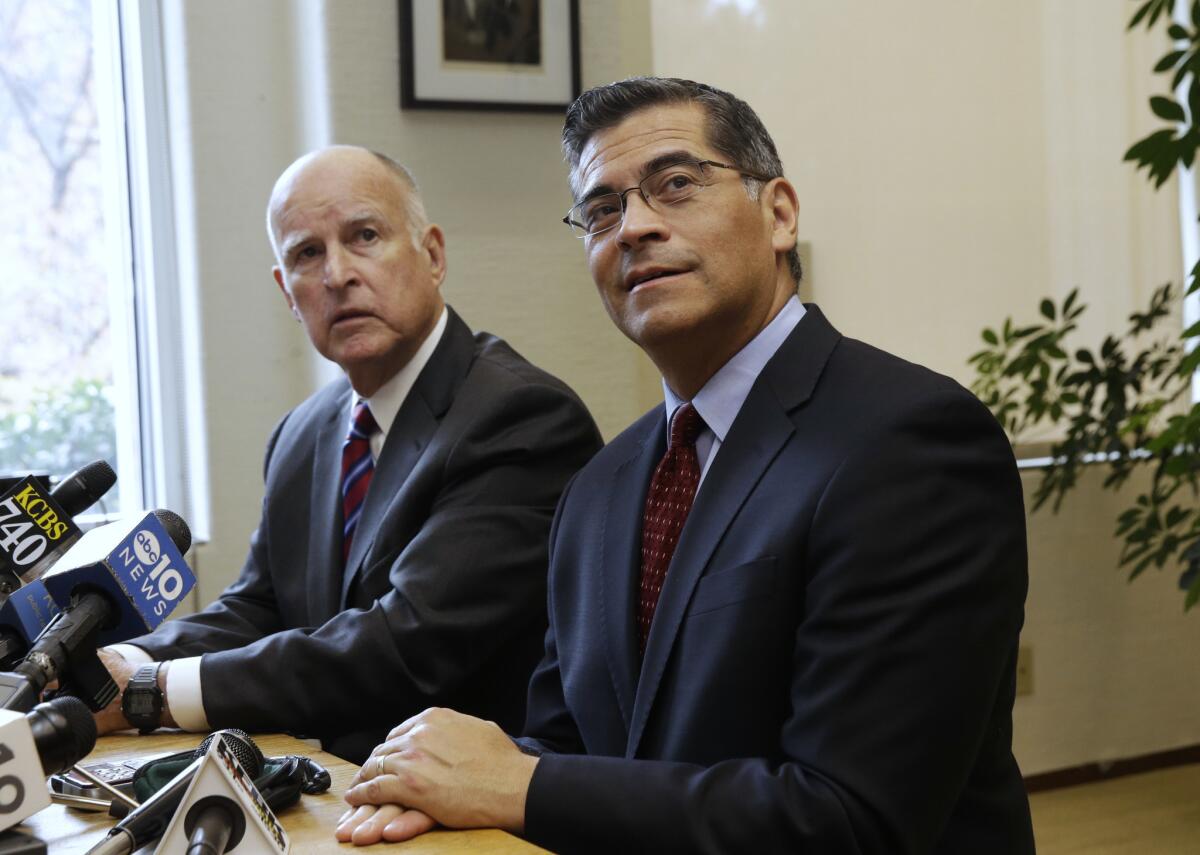
The state Senate on Monday voted 26-9 in favor of final confirmation of Rep. Xavier Becerra as California’s attorney general, putting on watch a veteran politician who has promised to block efforts by President Trump to roll back state policies on immigration, civil rights and the environment.
Becerra, a Los Angeles Democrat and 12-term congressman, is set to take the oath of office on Tuesday before Gov. Jerry Brown’s State of the State address.
“As Attorney General, Xavier will be a champion for all Californians,” Brown said in a statement after the party-line vote.
Brown appointed Becerra as the state’s first Latino attorney general to fill the vacancy left when former state Atty. Gen. Kamala Harris was elected to the U.S. Senate.
Senate President Pro Tem Kevin de León said Becerra will be an effective counter force to Trump, who has threatened mass deportations and the repeal of some environmental laws.
“Many of us know him personally and can attest to his character, to his integrity and to his qualifications,” De León said of Becerra. “He will be a strong partner for our state to help us work with the federal government when we can and to resist when we must.”
State Sen. Hannah-Beth Jackson (D-Santa Barbara) said Becerra understands the challenges ahead.
“He will indeed vigorously defend the values of our state by taking the fight to the federal government when necessary,” said Jackson, who chairs the state Senate Judiciary Committee.
Becerra, 58, said during two weeks of confirmation hearings that he would also fight any attempt to weaken environmental protections or adopt stop-and-frisk police policies that allow officers to search anyone on the street.
All Republican senators voted against Becerra or withheld their vote.
“I think when you are the top cop you have to enforce the law to the fullest extent,” said state Sen. Joel Anderson (R-San Diego) before he voted against Becerra.
Opponents cited Becerra’s support for sanctuary cities that refuse to have their officers help enforce immigration laws.
San Francisco prohibits local authorities from holding immigrants for immigration officials if they have no violent felonies on their records and do not currently face charges.
Trump has threatened to withhold federal funds from sanctuary cities.
Sen. John Moorlach (R-Costa Mesa) also opposed Becerra, saying he is worried that the antagonistic tone being set by Democratic lawmakers with Becerra could put at risk the $86 billion the state and its cities gets annually from the federal government.
“I don’t want to jeopardize those funds,” Moorlach said.
Becerra said he was humbled by the vote and ready to get working.He plans to meet soon with county sheriffs to discuss local law enforcement issues.
“As I embark on this new journey, my compass will be the experiences of hard-working families like the one I grew up in,” Becerra said. “As the son of immigrants, I know how important it is to protect the rights and dreams of every aspiring American. I will make sure no headwinds from outside our state can knock us down.”
- Share via
Attorney general nominee Becerra questioned on guns, death penalty and pot during confirmation hearings
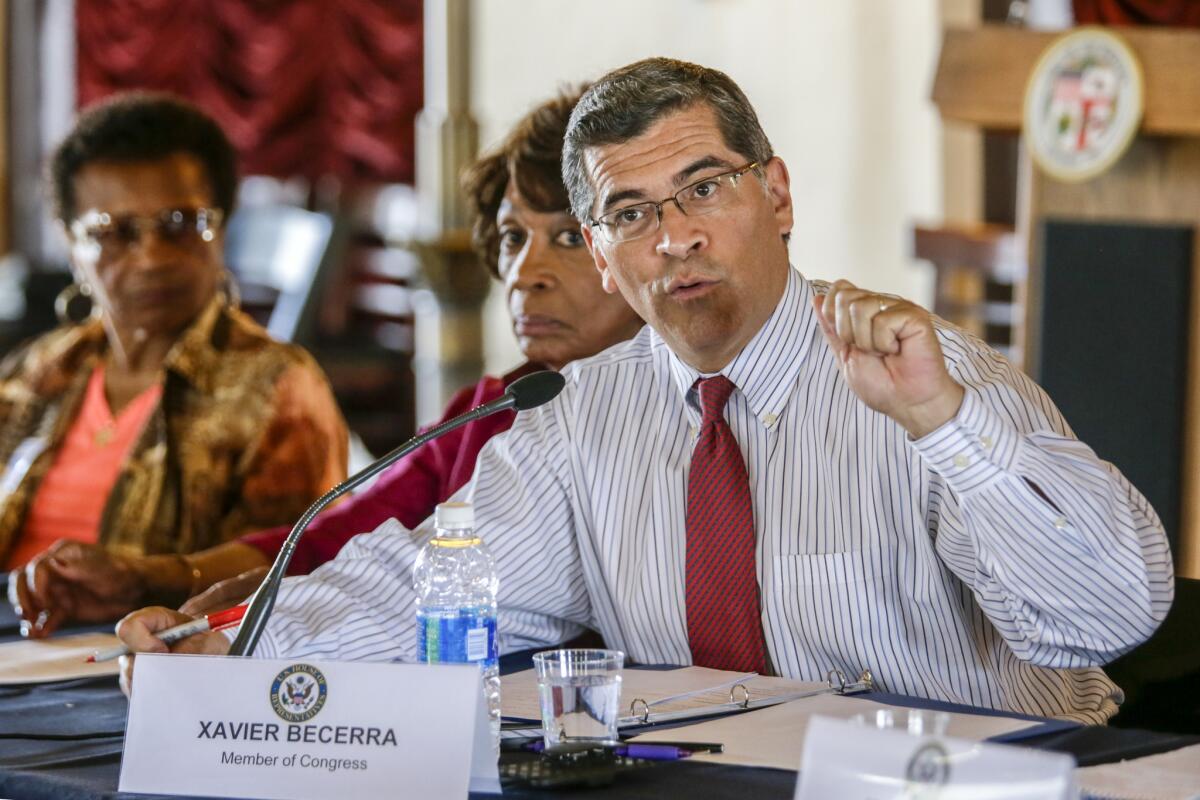
In two weeks of confirmation hearings, state attorney general nominee Xavier Becerra has been asked for his position on many issues, including new gun control laws, the state’s death penalty policy and the recent voter approval of an initiative that legalized recreational marijuana use.
The 12-term congressman is up for a possible final confirmation vote Monday in the state Senate.
- Share via
California attorney general nominee Xavier Becerra is warned against suing Trump early and often
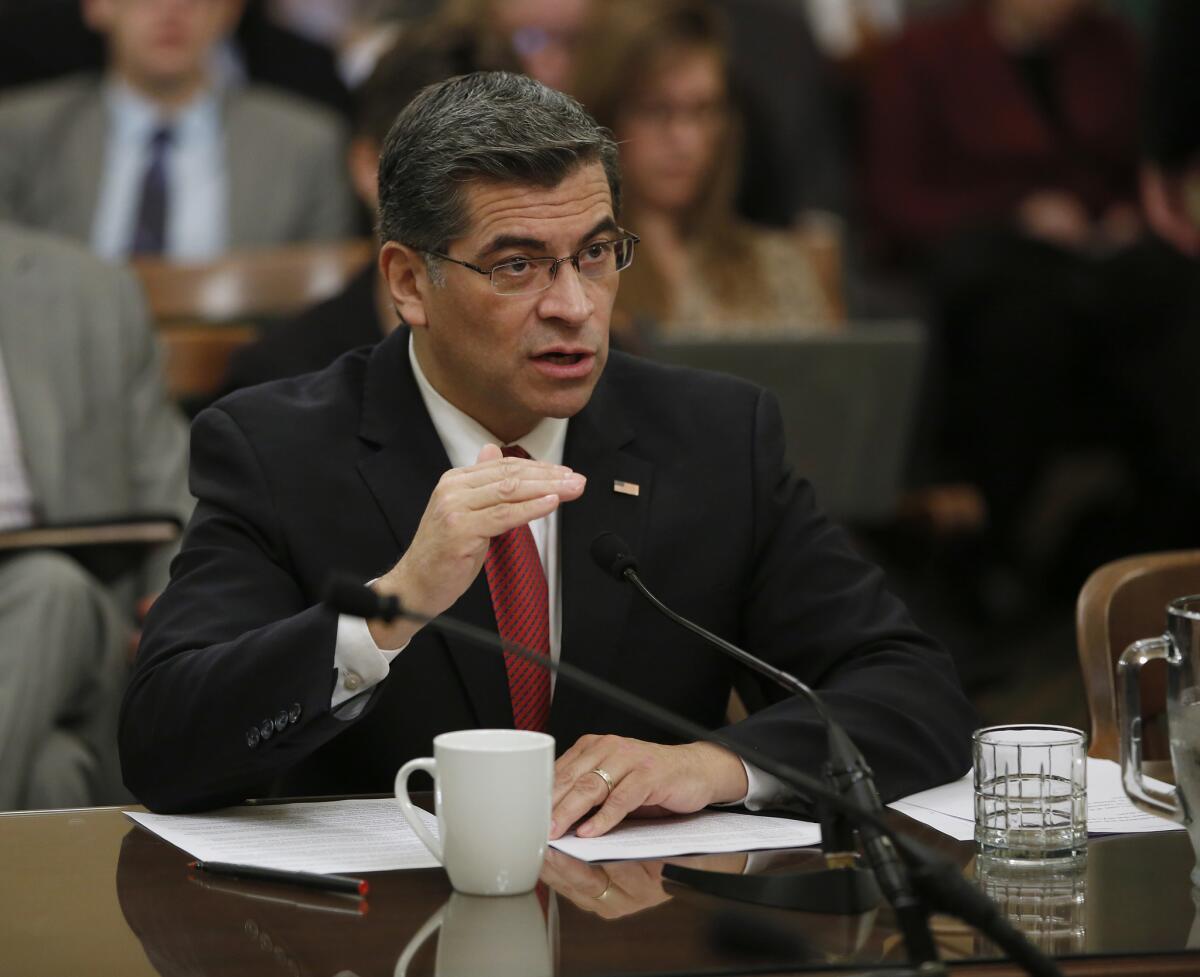
With Xavier Becerra facing a final confirmation vote Monday for state attorney general, two former high-level officials in the office are warning against drowning President Trump in lawsuits.
The pressure to sue Trump early and often is “a trap,” according to Michael Troncos, former chief counsel in the California attorney general’s office, and Debbie Mesloh, a former senior advisor to the California attorney general, writing in an op-ed piece published by the Los Angeles Times.
“In this right-wing political moment, a major legal case on our climate change laws or our policies benefiting (young immigrant) Dreamers may well lead to a Trump White House victory, establishing precedents that far outlast this presidency,” the two write. “In fact, the cases Becerra chooses not to bring may be among his most important achievements. Courts can’t rule on what’s not before them.”
Troncos and Mesloh said California will be up against a U.S. Supreme Court “remade in Trump’s image,” and that “[a]sking a federal court to overturn federal immigration policies could be a fool’s errand.”
- Share via
California cities would have to make it easier to build houses under new legislation
California cities that are falling behind on housing production goals set by the state would be forced to remove some of their development restrictions under legislation from a Bay Area state senator.
State Sen. Scott Wiener (D-San Francisco) released new details in his bill, SB 35, Monday morning that would require cities to approve new housing in areas already zoned for high-density development provided developers set aside some units for low-income residents. The bill’s provisions would only apply in cities where growth isn’t keeping pace with housing production targets developed by the state every eight years that are designed to ensure California has enough homes for its growing population to live affordably.
Right now, that’s not happening. The state’s median home price of $485,800 is more than 2 1/2 times the national average, with the state’s poorest residents the hardest hit. And in the most recent eight-year housing cycle ending in 2014, production was less than half of the state target.
Wiener, a former San Francisco supervisor, said California’s affordability crisis requires the state to involve itself more in housing development, which is primarily controlled by local governments.
“Local control is about how a community achieves its housing goals, not whether it achieves those goals,” Wiener said in a statement. “SB 35 sets clear and reasonable standards to ensure that all communities are part of the solution by creating housing for our growing population.”
Wiener’s bill is a narrower measure than a failed effort proposed by Gov. Jerry Brown last year, which also took aim at local development rules. Unlike Brown’s proposal, Wiener’s would only apply to cities behind on their housing targets and on sites already planned at high densities. Wiener also would require developments that would qualify for speedier local review to pay construction workers at a rate often equivalent to labor union wages — a key point that caused the state’s construction worker union to oppose Brown’s plan.
When unveiling his budget this month, Brown said he would consider supporting legislation that would limit some local development restrictions. A spokesman for Wiener said SB 35 was the senator’s response to Brown’s position.
- Share via
Immigrants would be shielded from deportation in low-level drug cases under new bill

A California lawmaker plans on Monday to reintroduce a proposal designed to shield immigrants charged with low-level drug offenses from deportation, as long as they seek rehabilitation and counseling.
The bill by Assemblywoman Susan Talamantes Eggman (D-Stockton) would allow defendants without any prior violent offenses or convictions within five years of their arrest to enroll in a drug treatment program for six months to a year before entering a guilty plea.
Courts would have to wipe defendants’ charges from their records should they successfully complete the pretrial diversion program. But judges would be required to terminate the treatment and reinstate the criminal proceedings for those offenders who do not perform well.
The proposal seeks to tackle a discrepancy between state and federal law: Drug diversion programs across the state require defendants to first plead guilty to drug charges before opting for treatment. But nearly all drug convictions still stand under federal law, triggering deportation, even if a person completes a program and has their state charges dismissed.
A similar bill made it through both houses of the Legilsature in 2015 but was vetoed that October by Gov. Jerry Brown, who said it eliminated “the most powerful incentive to stay in treatment — the knowledge that the judgment will be entered for failure to do so.”
Eggman said she believes that the idea was good then and is especially important now, when there is no indication how immigrants — legally or illegally in the country — will be treated under the administration of PresidentTrump.
“It might be a more complex discussion this year, and it’s a discussion we should have,” she said. “If our laws are meant to treat everyone the same, then why wouldn’t we want that opportunity for treatment available to anyone without risk for deportation?”
- Share via
California Politics Podcast: For the state’s Democrats, the battle begins
California’s leading Democrats have been talking for two months about what the new president will mean for the state. But an equally important question may be: What will it mean for them?
On this week’s California Politics Podcast, we discuss not just the effect of President Trump on state policies but also on how the national debate might influence the early jockeying in the 2018 race for governor.
We also take a closer look at the most significant policy question for California under the Trump administration: The repeal of the Affordable Care Act.
I’m joined this week by Anthony York of the Grizzly Bear Project.
- Share via
California’s newest senator takes the stage at Washington rally; congressional Democrats tweet support for march
For live updates throughout the day on the women’s marches in Washington, D.C., Los Angeles and others around the world, follow along with us here.
- Share via
California Senate leader Kevin de León on the inauguration: ‘I can’t say that our country is united’
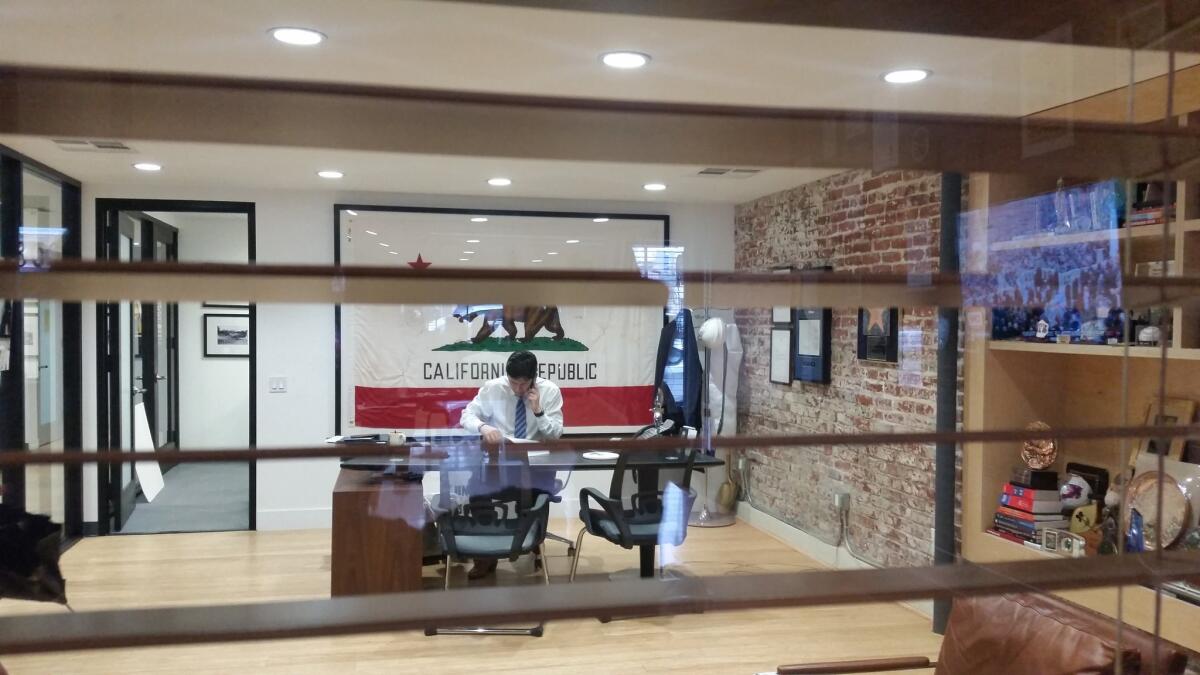
Kevin de León didn’t say much during Friday’s inauguration ceremony, and neither did most of the staff and supporters gathered to watch it in his Echo Park office Friday.
“A stunned silence,” De León said with a half-smile, as Donald Trump took the stage to be sworn in as the nation’s 45th president.
Just yesterday, De León, who has quickly placed himself at the front of California’s resistance to the Trump administration, had plenty to say. He accused Trump of trying to “seed confusion and chaos,” and said the new president’s plans for an immigration crackdown were sowing fears among his constituents of “raping and pillaging.”
But he was a bit more reserved, even wistful Friday morning.
“This was supposed to be my first inauguration,” he said of earlier plans to attend former Democratic presidential nominee Hillary Clinton’s inaugural if she was elected. “Was.”
De León offered little commentary during Trump’s speech. When Trump promised that “America will start winning again,” De León looked at the television and asked, “When were we losing?”
After the speech, the state Senate leader spent the rest of the morning touring a community center where homeless youth go to eat, rest and shower. He listened to young people in their 20s describe their struggle to find permanent housing and the long wait for Section 8 housing vouchers.
“On a day like this for our country, it’s important to see these challenges that we still have to face,” De León told Heather Carmichael, the center’s executive director.
After that came an appearance at a small rally in downtown Los Angeles, where protesters shielded themselves from the downpour with soggy umbrellas and ponchos.
Later, back at his office, De León reflected on the “consternation, fear, panic” he said many Californians and Americans were feeling as Trump took office.
“I can’t say that our country is united on this historic day,” he said.
- Share via
Gov. Jerry Brown hopes to install the new attorney general during his State of the State speech
- Share via
California regulators detail path toward hitting ambitious climate goal — and the state has a lot of work to do
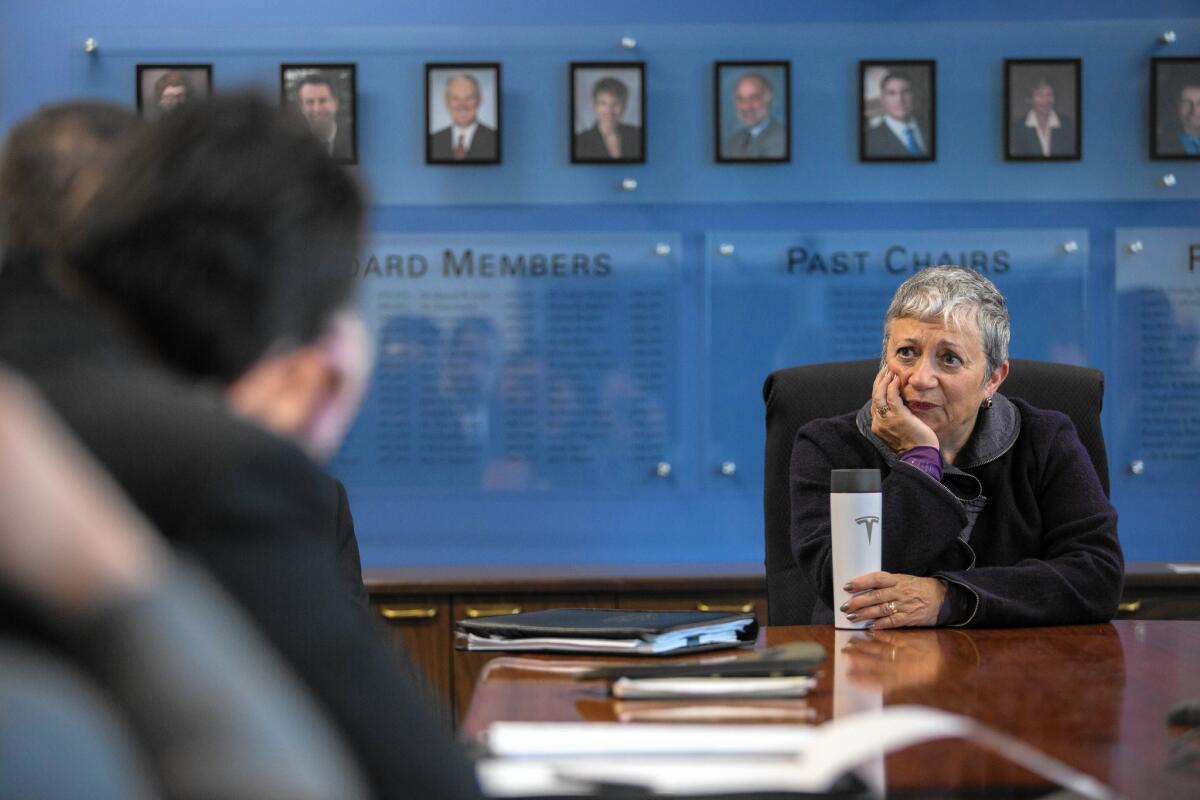
If California wants to hit its goal for reducing greenhouse gas emissions, it has a lot of work to do. That’s the inescapable conclusion from a new report released by the Air Resources Board on Friday, which detailed a range of proposals for new regulations.
Legislation signed by Gov. Jerry Brown last year requires the state to slash emissions to 40% below 1990 levels by 2030, which is equivalent to 260 million metric tons.
As the graphic below shows, the law requires California to squeeze into a smaller carbon footprint at the same time its economy and population is expected to grow.
Friday’s report says current policies will only get the state down to 310 million metric tons, 20% too high, and even reaching that point will likely prove difficult. For example, state officials have already been struggling to get enough zero-emission vehicles on the roads.
However, California leaders say this is the pace of change that the entire world will need to match in order to avoid some of the most catastrophic effects of climate change.
For the state to hit its goals, the Air Resources Board is proposing two major policies. First, regulators want to slash emissions from refineries by 20%, which would be achieved by requiring facilities to become more efficient.
Second, they want to continue the cap-and-trade program after 2020, something Gov. Jerry Brown emphasized earlier this month. The program requires companies to buy permits to release emissions.
Regulators suggested some possible changes to cap-and-trade, such as reducing the use of offsets, a controversial practice that allows polluters to support climate-friendly projects in other areas of the country instead of cleaning up their own operations.
“Climate change is impacting California now, and we need to continue to take bold and effective action to address it head on to protect and improve the quality of life in California,” Air Resources Board Chairwoman Mary Nichols said.
The proposals released on Friday will likely be the subject of heated debate and possible revision before regulators consider them for approval in April.
Michael Wara, a Stanford law professor who focuses on energy and the environment, called California’s climate goals “unprecedented.”
“People outside of California who work on these issues see that target and say, ‘What? Are they joking? That is insane,’” he said.
- Share via
Republican legislators are on the scene at Trump’s inauguration
- Share via
Sen. Dianne Feinstein didn’t attend the inauguration of President Trump
- Share via
California lawmakers prepare for a new president, many quietly watching while others speak out
After an election and transition season that was anything but quiet, California lawmakers largely planned to mark Friday’s inauguration of President-elect Donald Trump with little public activity.
Gov. Jerry Brown is in Sacramento with plans to privately observe the events in Washington, according to his office. Other prominent elected officials also planned low-key days while Trump and congressional Republicans celebrated in Washington.
Democrats in the state Assembly, meantime, penned what an open “letter to Californians,” listing priorities from the environment to welcoming “refugees and immigrants.” The letter was also distributed as a video featuring two dozen Assembly Democrats.
Five Assembly Democrats chose not to sign the joint letter of principles: Assemblyman Rudy Salas (D-Bakersfield), Assemblyman Adam Gray (D-Merced), Assemblyman Tom Daly (D-Anaheim), Assemblyman Jim Frazier (D-Oakley) and Assemblywoman Sharon Quirk Silva (D-Fullerton).
Most legislators chose to spend the day in their districts, with state Capitol sessions not scheduled for Friday. A few Republicans traveled to Washington for the Trump inaugural, including state Sen. Joel Anderson (R-San Diego), who posted a photo online on Friday morning as the crowd gathered outside the U.S. Capitol.
- Share via
On Kevin McCarthy’s home turf, Democratic legislators warn against Obamacare repeal
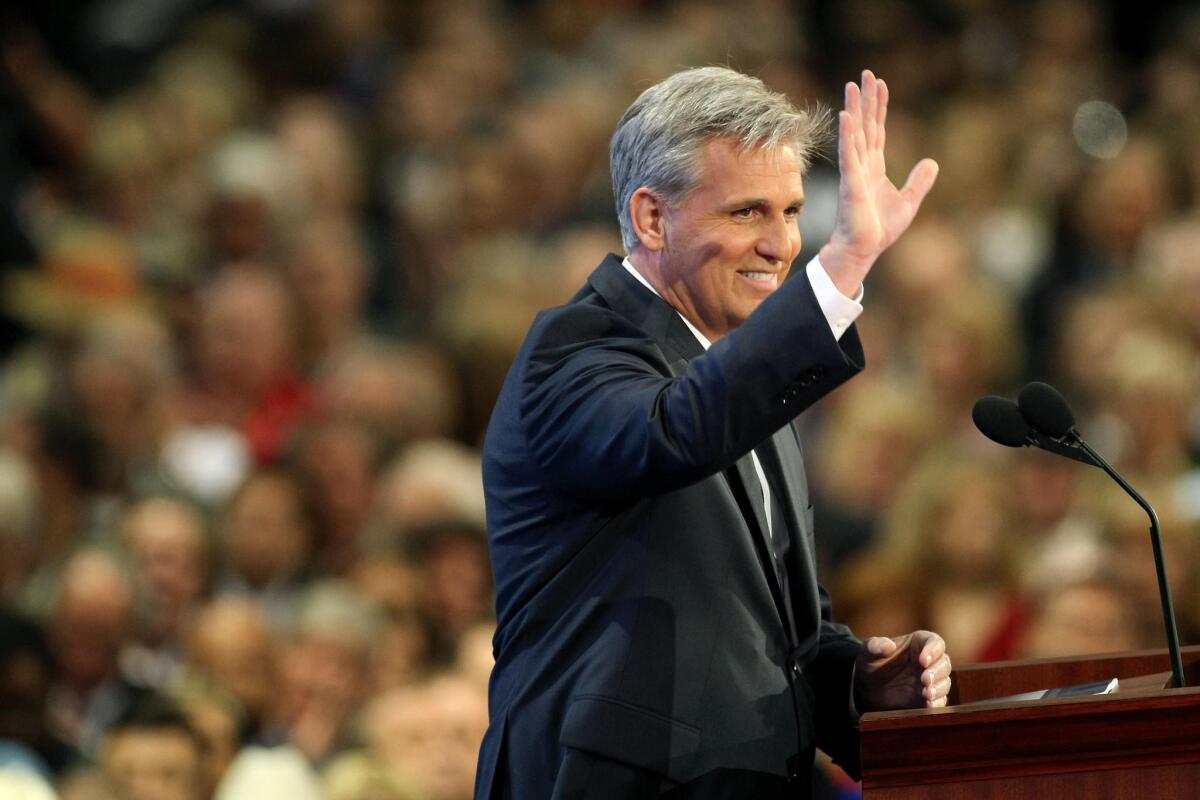
Democratic legislators took their pro-Obamacare message on the road Thursday, convening a hearing in Bakersfield to examine the repercussions of repealing the Affordable Care Act.
The state Senate health committee pointedly held its hearing in the Central Valley — far afield form the state Capitol and the home districts of most members in attendance, but the home turf of key Republican members of California’s congressional delegation including House GOP leader Kevin McCarthy.
Lawmakers and witnesses took pains to emphasize the looming effects of repeal of the Affordable Care Act in the region.
“There are few regions in the country that have had more gaps in its healthcare system than [Madera, Fresno, Tulare, Kings and Kern counties] in the years before implementation of the Affordable Care Act,” said Sen. Ed Hernandez (D-West Covina), who chairs the health committee.
The area is particularly reliant on Medi-Cal, the subsidized healthcare program for the poor that relies on both state and federal dollars. In Tulare County, 55% of the population is enrolled in Medi-Cal, according to the California Budget and Policy Center; in Kern, home to Bakersfield, 45% of the population uses the program.
The UC Berkeley Labor Center estimates that more than 95,000 people in Kern County who were eligible for Medi-Cal under Obamacare would lose coverage in case of repeal, as well as nearly 55,000 people in Tulare County.
Health Access California, an advocacy group using the UC Berkeley data, estimated that nearly 70,000 people in McCarthy’s district alone would lose access to Medi-Cal.
McCarthy’s Bakersfield-based district has been a flashpoint in the debate over healthcare overhaul in recent days. In letters to the Republican leader, Gov. Jerry Brown, Insurance Commissioner Dave Jones and state Sens. Kevin de Leon and Hernandez all emphasized the harmful impact to Kern and Tulare counties, which McCarthy represents, should Obamacare be repealed.
McCarthy was slammed in a Sacramento Bee editorial for pursuing repeal at the detriment of his own constituents. The congressman responded by saying the Medi-Cal coverage numbers belie the insufficient healthcare the program provides. He also faulted critics for not anticipating a replacement plan that Republicans have promised to offer.
Attendees at Thursday’s hearing stopped short of explicit jabs at McCarthy, but the Central Valley-focused theme of the day was unmistakable.
Kern County Supervisor Leticia Perez warned that rolling back Medi-Cal coverage would drive more patients to emergency rooms, straining the local public hospital, Kern Medical Center.
“This would have a devastating impact on Kern Medical’s bottom line,” she said.
Tony Iton, senior vice president of healthy communities at the California Endowment, presented a study showing troubling high mortality rates among middle-aged working-class white men in the Central Valley, largely due to chronic stress that is pointing people to suicide or substance abuse.
“These causes of death scream out for greater investments” in mental healthcare and substance abuse treatment, Iton said, noting such services are expanded by the Affordable Care Act.
“It is the worst possible moment to be withdrawing access to healthcare in the Central Valley,” Iton said.
- Share via
The newest candidate to replace Rep. Xavier Becerra is a model and says he’s a former mixed martial arts fighter
The race for the 34th Congressional District has its latest candidate: an L.A. neighborhood council member who has made a living as a model and a mixed martial arts fighter.
According to his campaign spokesman, Mid-City West Community Council member Keith Kirkwood is a former “full combat fight champion,” and was an MMA fighter in Europe and Asia.
He said he now primarily makes his living as an entrepreneur and investor in ventures such as minor league basketball teams and reality television shows, and also formerly owned a restaurant on the East Coast.
Kirkwood, 33, has modeled for clothing brands and as a walk-on for TV shows, according to an industry profile page. The Massachusetts native moved to California several years ago, according to a profile in his hometown newspaper.
He was elected to the Mid-City West Community Council, part of Los Angeles’ network of neighborhood councils, last year.
“You just see things that you think you could do better,” Kirkwood said in an interview posted on YouTube. “What I was seeing was just a lack of leadership that inspired, that made you want to get up and get involved in the community or in your neighborhood.”
Kirkwood joins at least 17 other candidates in the race for Rep. Xavier Becerra’s seat, which he is expected to give up in the very likely event he is confirmed as California’s next attorney general.
UPDATE:
Jan. 20, 5:49 p.m.: This post was updated to include additional information about Kirkwood’s current occupation.
This post was originally published on Jan. 19.
- Share via
It’s time to talk 100% renewable energy, California Senate leader says
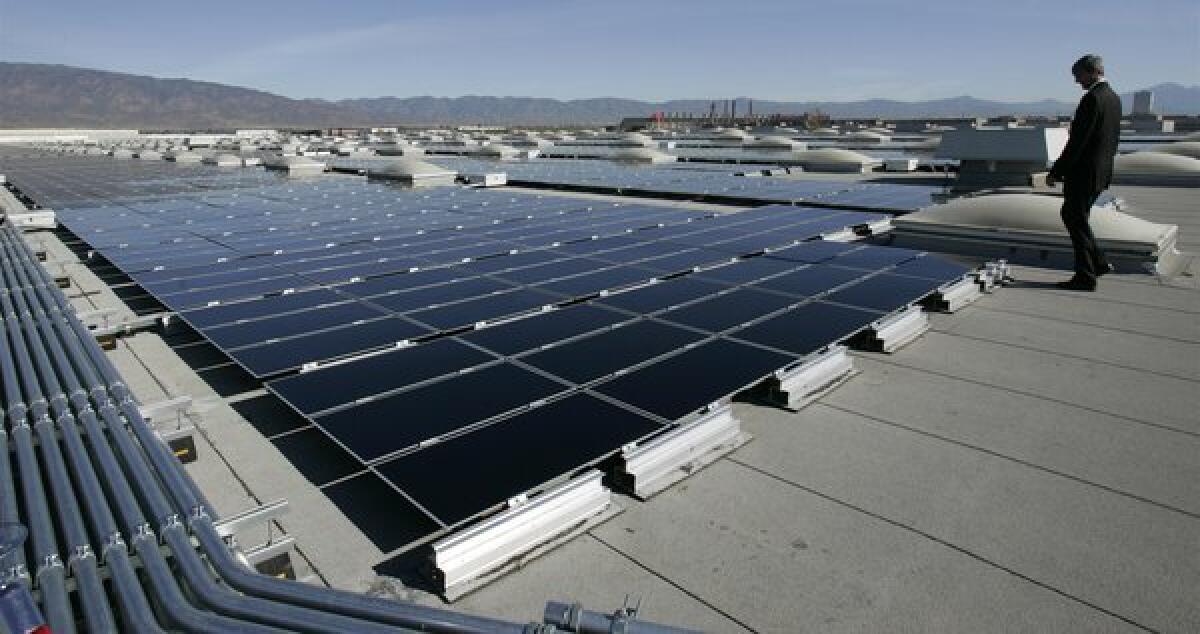
Two years ago, California Senate leader Kevin de León pushed through a law requiring the state to generate half of its electricity from renewable sources by 2030.
On Thursday, he said there was a mistake in the legislation, SB 350 — it didn’t go far enough.
“We probably should have shot for the stars,” De León (D-Los Angeles) told The Times.
California is moving faster than expected toward a clean energy future, he said, and officials should start thinking about policies requiring all electricity to come from renewable sources such as solar and wind.
“We should explore the idea,” he said, although he hasn’t decided whether to introduce legislation setting a new target.
Right now Hawaii is the only state with a 100% renewable energy goal, and it’s aiming to reach the target by 2045.